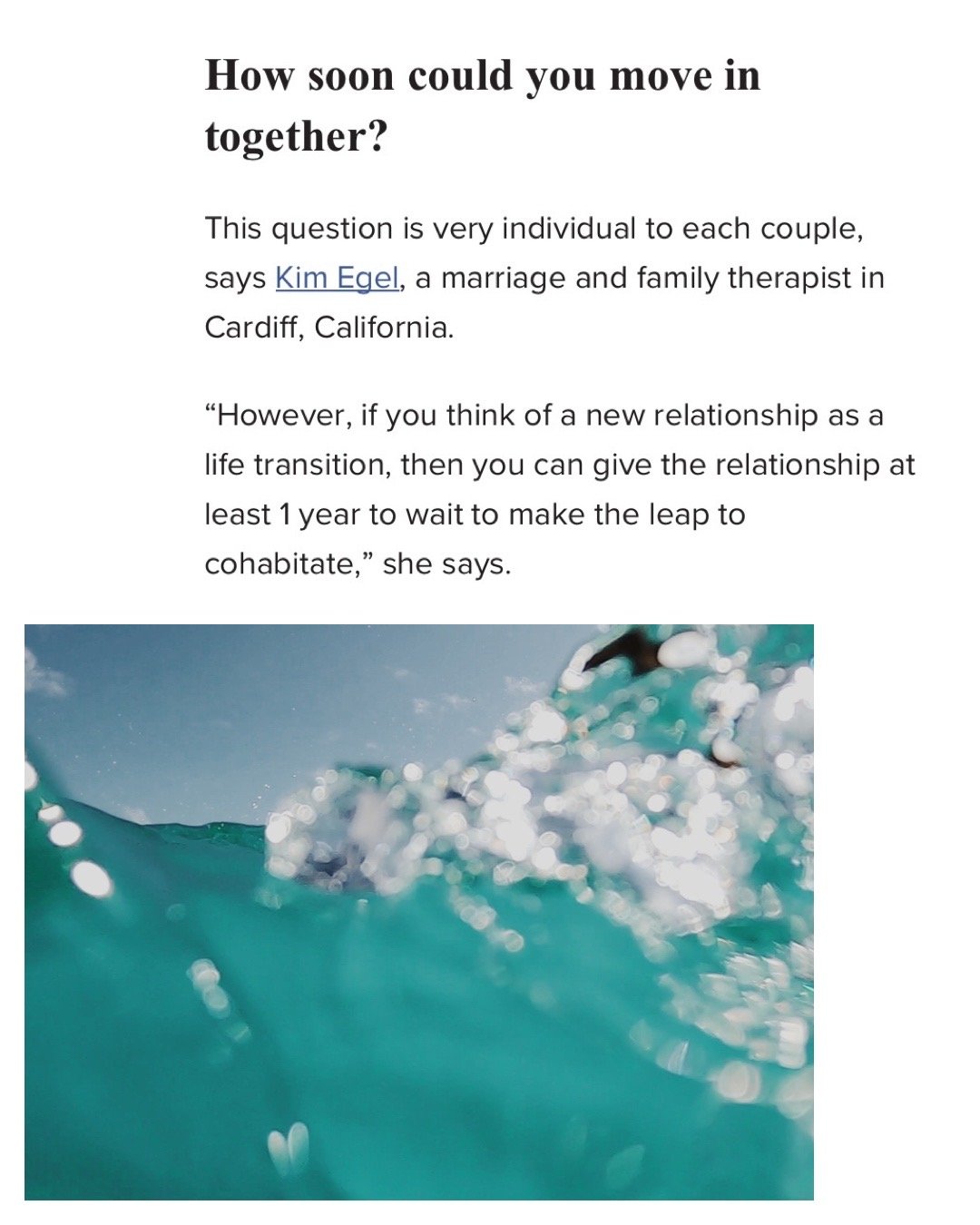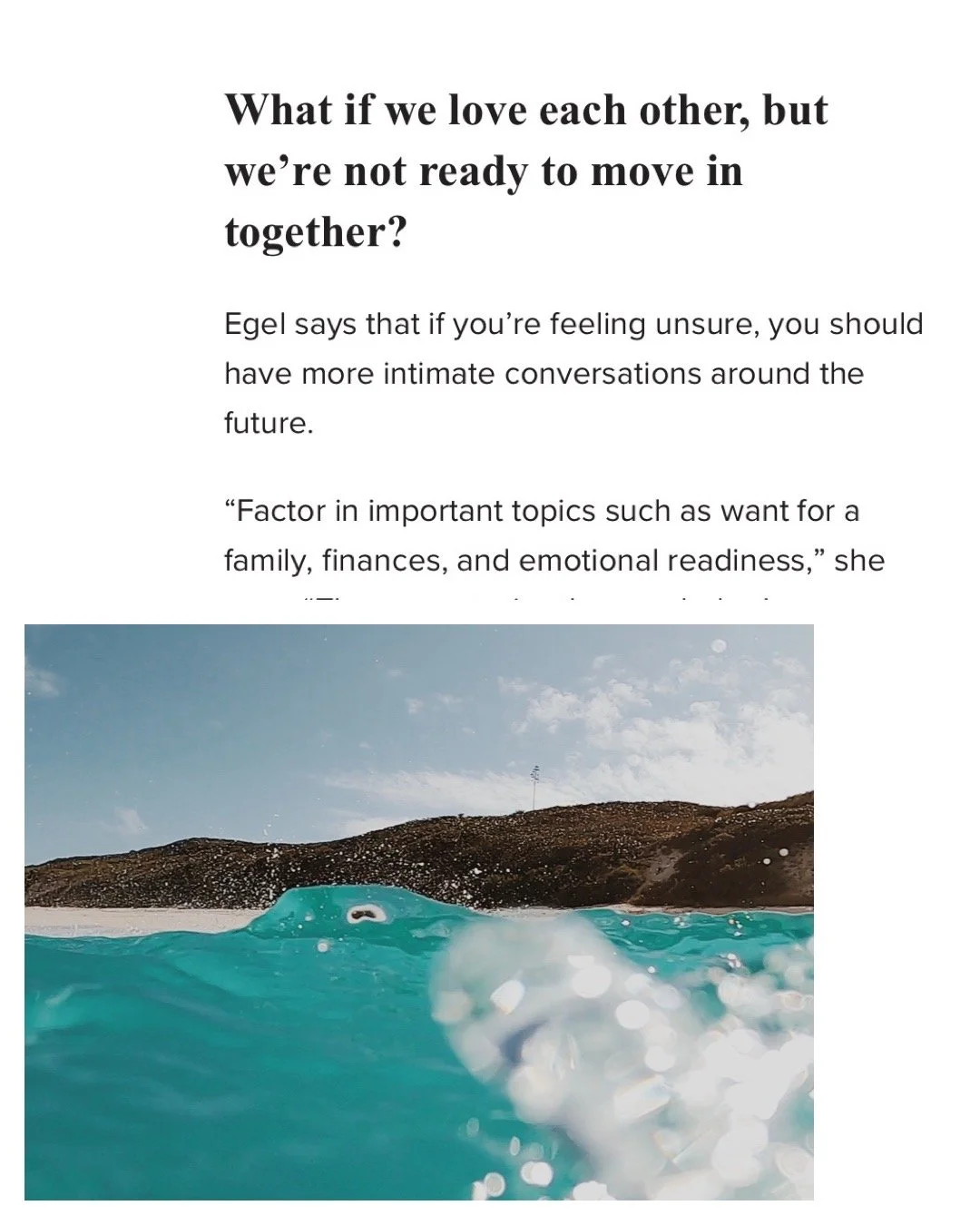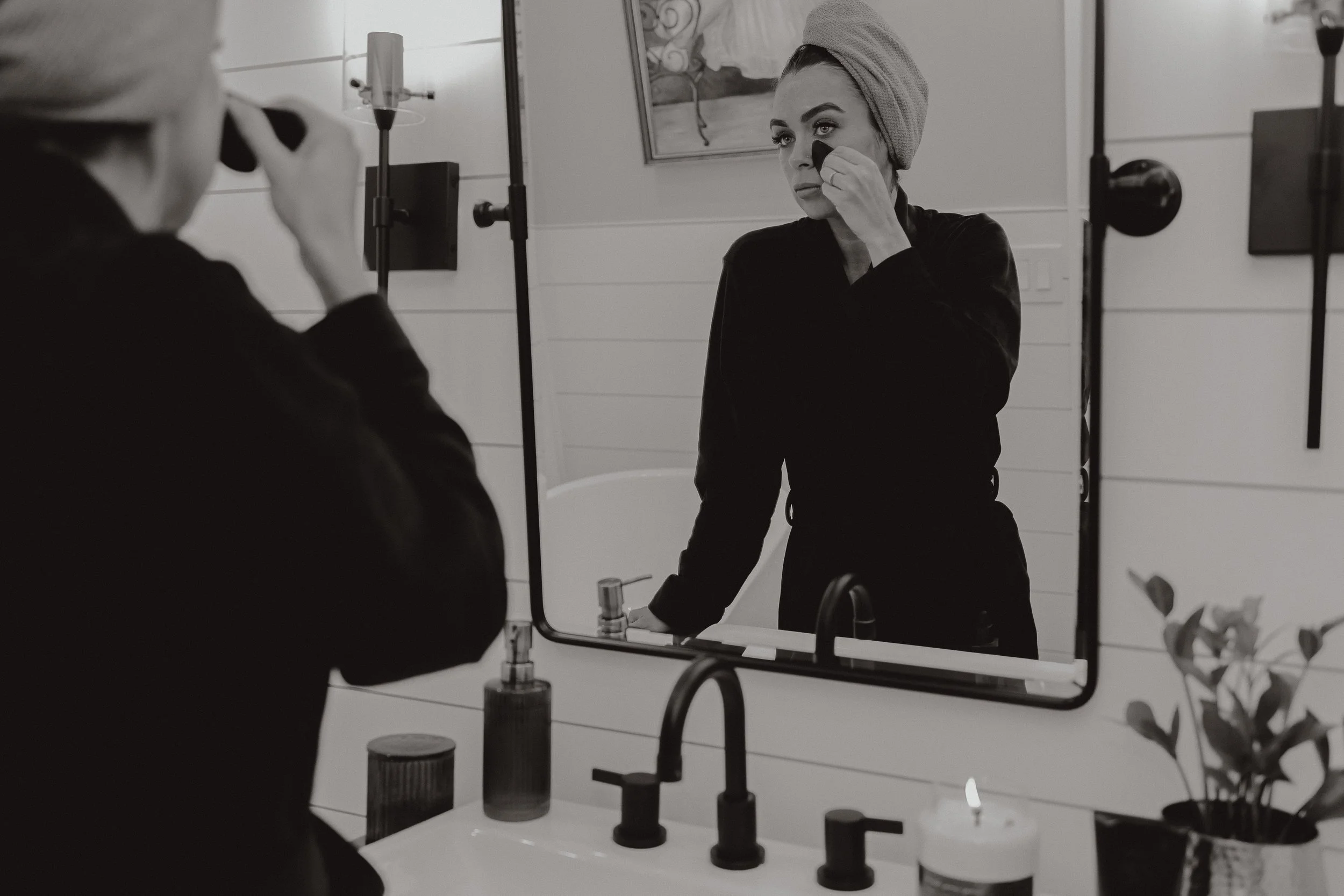Co-Parenting With A Narcissist? 7 Tips To Make It Work & Support Your Child
The attention and energy that it takes to be a balanced adult and also a parent can be challenging at times to say the least. Add in a co- parent that has a personality disorder (Narcissism) and BOOM, the challenge of showing up in a healthy and productive way becomes more difficult.
To be raw & real right out of the gates, being on the other end of a narcissist in any way, shape or form is a draining experience. It can feel as if you’re engaging in mental gymnastics with all the twists, turns, manipulations and big reactions that you will come across with being on the other end of this personality type.
I’ve collaborated with mental wellness site MINDBODYGREEN on a blog post about how to make co-parenting work when it comes to coping with a narcissist co-parent. Check out the full post HERE.
*Above image was taken in Big Sur by photographer and creator of honeyandgarden, Renata Amazonas.
Ready, Set, Go? When to Move in Together
If you’re currently considering moving in with a romantic partner this post is for you.
Taking a relationship to “the next level” by moving in together can cause a lot of anxious feelings, even when no “red flags” are present and it’s the obvious exciting next step within a relationship. To say it simply, moving in with a partner is a transition and all transitions in life come with change and the emotions that follow.
I’ve collaborated with PYSCHCENTRAL for this blog topic. Find the full post HERE.
*Above image by photographer and creator of honeyandgarden, Renata Amazonas.
How To Cope With A Dismissive or Unavailable Parent
Having a parent that’s not emotionally available, absent or dismissive in their ways is a subject that’s a huge source of pain for some of us.
As the story goes, we’re all “supposed to” be born from two incredibly loving and healthy people awaiting our arrival whom take care of all our needs. For those of us where there’s truth in having had this kind of upbringing, where two lovely humans provided a prime example of love, boundaries and optimum health; Good on you. I wish this for all. I truly do.
However, this post is for those of us who came from something different. Having a parent that was/is dismissive, absent or unavailable is a difficult reality to cope with and the effects could be dire. The range in which our needs were devalued or unmet varies, so I’ll be doing my best to speak to this topic generally as it’s depth is vast.
“My hope for this post, if anything, is to be a voice that lets you know that the invalidation from ANYONE doesn’t have ANYTHING to do with YOU not being worthy.”
Invalidation or demeaning behavior from another usually points to the pain that’s being projected on you from the emotionally wounded other that’s NOT YOURS. Remember, hurt people, hurt people. Another’s pain being misplaced and “put on us” is confusing and heavy. Learning to separate what’s your emotional “stuff” and what’s “theirs” will serve you greatly and help you heal. (Specifically for this post I’m referring to a dismissive parent’s unhealed and projected pain which has caused YOU to suffer.)
Let’s get into this topic with a bit of Q & A.
Q: What does a dismissive or unavailable parent look like? (How to identify a dismissive, absent parent)
A dismissive parent can be incredibly non validating, lack empathy and the ability to be child focused. Meaning the parent has an inability, lack of capacity or desire to be involved with their child’s development. This can show up as non-engagement in their child’s activities or disinterest in conversation around topics that have to do with their child’s relationships and interests (unless it benefits the parent to do so.)
An absent or dismissive parent can bring up feelings of shame; whether they are shaming toward you or whether you begin to shame yourself because of the inner confusion around their absence or condescending ways.
Incredibly complex, hurtful and confusing questions for a developing child or hurt adult could be:
"Why doesn't mom want to spend time with me?"
"Why did dad leave?”
“Why doesn’t mom validate my accomplishments?”
“Why does dad act like he doesn’t care?”
“What’s wrong with me?”
Q: What are the clinical effects in adult life from growing up with a dismissive, neglectful parent?
A lack of a solid sense of self throughout your childhood can very well carry into adulthood if you don't work through the difficult emotions and unmet needs that can present with exposure from a dismissive or absent parent. The chronic feeling of "never feeling good enough” and traits of perfectionism tend to be side effects of growing up with a parent that didn't provide consistent validation and modeling to create a healthy foundation for adulthood. Issues with intimacy and love in adulthood can be a side effect of having a parent who didn't provide an example of healthy love.
Generally speaking symptoms such as holding a lot of shame, a track record of unhealthy romantic relationships, low self esteem, low confidence, inability to self start or go after what we desire due to a poor self concept can be present. There's many side effects that tend to spiderweb into bigger issues when we grew up with a parent who was neglectful and dismissive.
Q: What are actionable steps to take in order to cope with an indifferent/distant/unavailable parent? (How do you handle this type of difficult relationship)
1. Create boundaries in order to keep yourself healthy. This might mean shorter phone calls and less visits, less overall engagement in order for you to create healthy boundaries and keep yourself mentally and emotionally balanced & stable.
2. Go toward available relationships in your life by attracting people who can hold space for you. (You need to experience how it feels for another to show up fully for you to recorrect old patterns of not receiving healthy amounts of love, consideration, empathy and healthy validation.)
3. Wok through any past or current difficult emotions of shame and hurt with a professional who can help you.
What are coping strategies to heal? (How to overcome the effects and pain that being on the other end of a dismissive parent causes.)
Do your best to create healthy present day relationships in order to help "correct" any sort of lack that you feel from the residual “side effects” of growing up without getting certain needs met. Honoring what was absent in your childhood as an adult (given that you’re in a healthy and stable place to do the tough introspection) is a path toward healing this root issue and the pain associated with it. I often speak to my clients who have come from an unhealthy family system about “corrective relationships.”
Q: What are “corrective relationships?”
A: They’re relationships that provide you with the unmet needs that you didn’t receive from your primary care giver.
Seeking relationships that organically shine a light on your strengths, are consistent, provide validation, are accountable and trustworthy is healing. We all need to be on the other end of relationships like this to form healthy attachment styles. (A great book for more on attachment styles HERE.) By seeking out people who are trustworthy, consistent and able to share and praise your accomplishments, rather than invalidate or ignore your credits, will help you “course correct “ just by being on the other end of them. Exposure to healthy relationships and being in connections that provide nurturing energy and mirroring is like drinking a green smoothie with all the good stuff.
It soothes the soul.
Establishing a strong community in the now will help you to feel respected and will provide a healthy example of what it feels like to be valued and truly loved for who you are. We all deserve and need this in our lives to have a healthy sense of self.
Maintaining a balanced and consistent self care routine where you take care of your needs by getting appropriate sleep, spend your time wisely, exercise regularly, eat well and spend time with people who value you is the foundation toward creating a healthy self concept. We’re all attracting relationships into our lives based on where we’re at, therefore starting with the relationship with ourselves and getting that “on lock” by doing the important self care steps is key.
Also, continuing to work through insecurities, creating better boundaries in your connections and paying attention to any shame that is present from the past that’s keeping you from thriving fully in the present will help you greatly.
*Depending on the level of pain and shame you hold, you may want to work with a therapist or coach to assist your healing process. If that’s the case for you, check out this post on How to Find The “Right” Therapist HERE.
*Image by Photographer & Creator of honeyandgarden, Renata Amazonas.
11 Ways to Be There For A Partner Struggling With Their Mental Health
It’s so important to have awareness and information around how to cope with a partner struggling with their mental health. I collaborated with wellness site MINDBODYGREEN on this post that offers 11 tips on how to support a partner that’s not in the best emotional and mental headspace.
Read the full post HERE.
*Image by photographer and creator of honeyandgarden, Renata Amazonas.
Holiday Mental Health Collaboration w/ Wellness Brand CLEVR
My most recent collaboration is with wellness brand CLEVR, a mission driven wellness company making plant based “magic” in coastal California. (I’m loving their latte mixes this season!) Check out the Q & A feature about how to keep your mental health alive and well during the holiday season HERE.
Happy Holidays friends. Be safe and merry.
*Image by photographer, Renata Amazonas.
How to Have Boundaries During the Holidays
Welcome to the holiday season friends. The energy is buzzing and there’s a lot of doing this time of year. A lot going on, even if it’s all in good fun, can pull us in different directions and zap our energy if we don’t take care of ourselves.
For some of us there’s also quirky family dynamics, pressure to spend on gifts, whether we have the funds or not, and an overwhelming or underwhelming amount of social engagements.
I believe that you can make this time of year less stressful if you know how to have boundaries and pay attention to what you need.
So, how can you enjoy this time of year rather than just creep by and get through it?
Here’s a phrase that really speaks to me and perhaps it can be helpful for you to remember right about now.
Just because you can; Doesn’t mean that you should.
You can DO and BE many things in this life, but it’s not that satisfying to live a life where you spend a lot of your energy doing things you feel you “should” and “ought” to do. It’s equally unenjoyable to spend your time and energy being someone who others want you to be, not who you want to be. I understand that there are certain situations in life where you take one for the team and do something that’s not your preference. That factor is apart of the journey and sometimes necessary. Although, for the majority of your choices, I wish for you to authentically consider what YOU want. (And for the record, NO that’s not selfish, its self honoring.)
This season offers some major practice if you struggle with people pleasing or your own guilty feelings around what you think you “should” do. I understand that it’s really difficult when what’s best for you upsets the people you care about. That’s a tough position to be in and it deserves to be acknowledged. However, anyone who cares about you in a healthy way will honor your self serving choices, whether they like them or not. Someone doesn’t have to agree with what you choose, however honoring you and your choices is a must for a healthy connection.
How often is it that you feel pressure to commit to an event or social activity because you feel you “should?” Your rationale might be that you “can” and have the time so you “should” go. Or you might find a way to validate why it’s “rude,” “inappropriate” or fill in the blank with the correct word that describes your inner, usually guilt influenced voice, that pushes you into situations that simply don’t fill you up. Evaluate your tendency to do what you think you should do or what others want you to do vs. listening to your truth. Be mindful of this tendency and work toward respecting yourself by making decisions that serve you and are respectful to your energy and priorities.
How you spend your energy is a huge deal. The trick is to learn the art of deciphering what’s the best use of your time given all the other priorities that you’re balancing.
To go a bit further, I wish for you to give yourself more time than you actually think you need so you have the space to enjoy what’s going on around you. Notice that when you’re bouncing from event to event, trying to fit it all in, you’re likely to show up with rushed energy. Slow down, be mindful of over scheduling. Rushing is exhausting. Period.
Tips to Support You During the Holidays
Be mindful of over scheduling. Even too much good stuff can be exhausting and over whelming. Plan accordingly.
Keep your guilt in check by deciphering if it’s guilt coming from you (internally) or if it’s external guilt, the guilt that others are putting on you. If you deem that it’s external, you might choose to have a respectful conversation with the other in order for you to communicate about your choices.
Create extra space and time to just be and to soak in all the things. Plan for more time than you think.
If this tends to be a time of year where loneliness and feelings of sadness intensify, try to express that to trusted friends who can hold that space for you. Sometimes just letting others know what’s going on with you is a way to feel less alone.
Volunteer and do for others. It always feels good and gets us out of our heads to give and do for others. Especially those others that are in need and don’t have the resources and means they we may have. It’s a win/win to give.
Keep up your healthy routines of exercising, eating foods that feel good in your body and getting enough sleep. The basics are so important. Balance out all the extra drinks and foods with the true blue things that you know work to keep your mind and body healthy.
I’m going to keep this message simple by encouraging you to honor what you want. Remember, you might have the time and means to do many things, although I want you to know that you have permission to forgo anything if it doesn’t serve you or feel right.
Just because you’re capable or have the means and time to do something doesn’t mean that you should. Avoid getting entangled in outside forces pulling you in various directions by honoring what you want this holiday season
Enjoy. Happy Holidays Friends.
*Image by Photographer Renata Amazonas and creator of Honeyandgarden.
What Overthinking Does To Your Life (And How To Stop)
“A mind too active is no mind at all.” -Theodore Roethke
Although overthinking is something many of us do, it’s important to be aware of the negative impact it can have on our lives that can get swept under the rug and normalized.
Overthinking can feel like torture and, if chronic, can chip away at the quality of our lives. It can numb out joy and make us feel incredibly alone. It can create strain in our relationships or even cause them to destruct depending on the degree of our overthinking and assuming ways.
When overthinking becomes excessive, it’s often a consequence of being overly criticized as a child. Over thinking is a trauma response of having to analyze the environments and behaviors of others in order to feel accepted, keep the peace and feel comfortable as a child. Healing begins when we can acknowledge this inner child part of ourselves that is still on high alert in a continued attempt to feel safe. Healing occurs when we address this behavior of overthinking and do the work to attune the emotions that are causing our need to be hyper aware and overly vigilant.
What I’m going to do in this post is offer some insight and perspectives to help you become more aware of your over analyzing ways so you can heal these destructive thinking habits and work toward becoming more peaceful and present.
I specifically use the word “present” because “being present’ is on the opposite spectrum of overthinking. When we’re “in our heads” (overthinking) we’re absolutely not present. One main tool to combat overthinking is to find ways that help us to BE in the moment. This post is for you to discover and create ways to do just that.
Let’s jump right in and discuss 4 symptoms of overthinking.
1. You Feel Less Joy
When you’re overthinking you’re not in the present moment. This is based on the mere fact that you can’t be in two places at once. If you find yourself consistently forgetful about details of your environment and the people in it, chances are that you’re preoccupied with the world going on in your mind. If your goal is to be happy what I can tell you with 100% confidence is that you will not find happiness by overthinking. On the contrary, a racing mind repels happiness.
Here’s what else is important for you to know. Overthinking is a bad habit and habits can be changed. I know several people who I’ve worked with that believed that there was nothing that they could do about their overthinking because it “is just the way they are”
Not true, my friend.
You are not your overthinking. It’s not in control of you. (Unless you allow it to be.) It’s actually the opposite: Overthinking is a habit that you can get a handle on and as you do your life will change for the better.
2. Your Relationships Are Feeling Disconnected
Have you ever spent time with someone who was clearly not present?
It can be incredibly frustrating to be with someone whose truly not with you because they’re caught in the intricacies of their mind.
When you’re out and about in life and spending time within your relationships, but not really “there,” the level of connection, presence, bonding, authenticity and overall joy is compromised.
A healthy relationship requires two people to show up fully in order to play and engage with each other. This is merely impossible when one party (or both) is not present.
I understand that we’re not perfect beings and sometimes we might have a day when our mind is in LA LA land (normal.) However, if “checked out” becomes a consistent state, there’s more to look at here. Your relationships will be at stake if just fragments of you continue to show up within your connections.
3. You Chronically Feel Exhausted
It takes a lot of mental energy to overthink. Over time one of the main side effects of chronic overthinking is physical exhaustion. If you feel constantly exhausted without any sort of explanation to why it could be your racing mind that’s leading you to feel so drained.
4. You Can’t Sleep
This point is pretty straight forward. Your thoughts can be keeping you from initially getting to sleep or awaking you in the wee hours of the morning and sabotaging your ability to rest peacefully. As many of us may know, a lack of sleep leads to so many other issues.
Now that we’ve discussed some symptoms that are present when we’re in our heads, let’s look at 6 practices to help rewire our thinking patterns.
1. Engage with people that can help you rediscover your presence.
Having relationships in your life that guide you toward rediscovering your presence is priceless. The mere modeling of being on the other end of someone who knows how to tap into the present moment will, over time, shift you into a more present person yourself. (Reminder: We do become more like the people who we choose to be around consistently. Choose wisely. Their habits will become your habits over time.)
Look for these present people in your world, value them and hang around them as much as you can.
2. Focus on Facts Not Stories (This is a big one)
This one is pretty cut and dry. A fact is a fact. It’s “what is,” for worse or for better. A fact is the truth of what’s happening or what has happened; It’s not your assumption or story about it. A story is your creative twist and take on a situation, which is not a fact. (Phew! Got that?)
Becoming more savvy by distinguishing the difference between when you’re reacting based on your story vs. the fact of the matter will greatly silence your tendency to overthink.
3. Practice the Cognitive Behavioral Method of “Thought Stopping” (With Acknowledgment of Your Emotionality)
Finding awareness of when you begin to “go down the rabbit hole” with looping thoughts, rumination and overthinking is key to thought stopping. What I’m doing in session with my clients who overthink is modeling thought stopping by guiding them away from their unhealthy habit of creating story. I do this by identifying the emotion (commonly anxiety or fear) leading the overthinking and proceed to shut down the “story” that they’ve created, which is driving their looping thoughts. It’s as if I’m picking out weeds from the grass. I’m picking out what we need to work through (the emotion) while ditching the false story, which is often what’s creating the discomfort and pain.
We usually are reacting more from our fear and story of what might be, rather than what actually is.
As you learn to do this with yourself, over time you will stop getting into destructive thinking loops that lead you to nowhere and you will learn to disengage from your assumptions. You will have so much more time for what is pleasant and true when your awareness increases around your ruminating habits. Discover more details about the thought stopping process here.
4. Move your body
In order to be a healthy person, finding a way to be active and get your blood pumping is a must. There’s very few things that I’m ever going to tell you is a must, and this is one of them. Through movement and breath we can help difficult emotions and stress “push through” our system. Without movement we become stagnant and stuck and start holding onto hard emotions that can literally make us sick. Move your bodies friends. It’s huge.
5. Get Curious/ Get Away From What You Know
Whether it’s an intentional trip to a different part of your town that’s unexplored, a weekend trip somewhere new or traveling outside of the country, please go toward the unknown. This is important because when we go toward our curiosity, we simultaneously go away from our routine and what we know. Our presence is required when we’re not familiar with our surroundings, which automatically gets us out of our heads and into our lives.
6. Find Some Healthy Distractions
Find ways to engage in activities that help your mind focus such as crossword puzzles, a game of chess, reading, engagement in a good film, etc. These activities are like mind aerobics and help focus your mind on something that squashes the tendency to ruminate, loop or overthink. Our brains need to exercise too.
All and all, the biggest take away that I want you to know is that you can do something about your overthinking. If your mind has a hold of you, this is not the way you have to keep living your life. You are not stuck. Finding relief from overthinking is a matter of finding the right “tools.” With awareness, practice, a desire for change and the commitment to “do the work,” over time you will find relief from your hyper analyzing ways.
If you feel like you need more guidance toward combating your negative thinking habits there’s many different ways to search for a therapist and find the right “fit” for you. Check out my post on How to Find the “Right” Therapist for more pointers toward a successful search. Also, feel free to reach out to me with any questions or direction. I’m happy to help.
You can find this article published on @themindsjournal HERE.
Find my youtube video on overthinking HERE.
*Above image is a joint collaboration by Renata Amazonas Photography & Ashley WIlliams Photography.
How Mistakes Encourage Your Growth
For all of you out there afraid to make a move in your life because of the fear of making a “mistake,” this ones for you.
I invite you to try on the perspective for a moment that the biggest mistake of all is consistently protecting yourself from making any. Making no move and no mistakes in life will get you nowhere and keep you in stagnant waters, my friend.
“Making a mistake” in life seems to have a really negative undertone, when often, it’s within our mistakes where we gain clarity, grow and are exposed to valuable information. If you can look beyond any self proclaimed “mistake” my guess is that there’s a gift of insight for you to take in. Often, that very insight will provide momentum that can direct you to your next destination in this journey called life.
Feeling stuck, stagnant and lost in life is an extremely uncomfortable and agonizing feeling. Don’t doubt that even the friend, acquaintance or individual who appears to have it all together and envisions perfection on instagram has felt or will feel that feeling too. Just a reminder that we all have our struggles, we all have our hardships. None of us are alone in that.
For the purpose of this article, I’m writing to my “road less traveled” life adventurers. Often those are the ones of us that can get really lost on the dark road, for they tend to be the group that goes thicker into the forest. It takes one to know one and in this post I will join my clinical skills as a licensed therapist combined with what I’ve learned personally from feeling utterly lost at points of my life to potentially help guide you.
With that said, I want to pose a friendly reminder that life is a journey and if you’re truly living it listening to yourself rather than following the constructs of what you should and ought to do, you will feel stuck at times or even extremely lost along the way.
I believe that “lost” feeling goes with the territory of carving your own path. It’s a brave thing to do. It takes courage and a heightened ability to cope with uncertainty when you’re choosing the road less traveled. This is sometimes why some of us choose the path that’s visible and has clear markers. It appears to feel more safe, and us humans, whether we like to admit it or not, tend to go toward the comfort of the “known” as it’s more inviting and appealing to many of us.
The road less traveled is not laid out for you. This path will require you to walk with fear and keep your anxiety about the uncertain steps ahead at bay while continuing to trudge onward. Remind yourself that choosing to go “the road less traveled,” although unknown, will expose you to the excitement of untapped terrain that’s filled with goodies. If you keep going, you will eventually see some sort of “light” that will direct you. Your work is to be able to hold on tight enough when you’re lost in the dark in order to make it to the light which will provide a direction for you to follow.
If you find yourself questioning your life more than others around you, please try to refrain from comparison. My guess might be that you’re comparing yourself to “others” who made the decision to go down a more well lit road. Neither path is wrong or right. The key is to decide which kind of traveler you are in this life and stay true to what’s in your heart.
Let’s start with a question: What does making a mistake mean to you?
Universally, a mistake often means that we find ourselves unhappy with the result that has come from a choice we’ve made about a person, place or thing. When we hold a lot of fear around making choices, our tendency to hit “bigger” bumps along the way increases for life requires us to choose everyday all day long.
We have to make choices, whether we want to make them or not. Our choices will and do create the tone and context of our overall life. What we choose to put in our mouths every meal, over time, results in what our health and physical body looks like. How we move our bodies everyday, overtime results in our physical appearance and dictates how we feel in and about our bodies. When we choose to go to sleep and wake up dictates the energy and mood that we bring to the day.
With that said, let’s get to it and discuss tips for you to consider if you’re feeling stuck or lost and are seeking a way toward the light.
Here Are 4 Tips to Becoming Unstuck
1. Make one small, new & healthy decision and keep following the momentum of that single choice consistently.
Watch for: Over thinking, negative thinking, talking yourself out of following through with your decision, devaluing your idea, arguing “why” the idea is not a good choice.
The point of making small decisions and following through with them is to retrain your brain and re wire your habit of being frozen and stagnant. I want to pose that if you’re finding yourself stuck, it’s often because you’ve created a habit of not following through on ideas or executing choices. I want you to wake up and work out your choice muscle on small, benign decisions. Start making firm choices with clarity and confidence with the little things, even if you’re not confident about it, just go with it and follow through with a choice.
The point here is to re-fire a muscle that has been dormant. I’m less concerned about your choice here, and more encouraging you to just make a choice for the exercise of making one. We’re working on eliminating your habit of stagnation by no decision making.
Remember, no choice is a choice, so in all reality you’re making the decision to do nothing when you’re stagnant and stuck in life. I know that can sound harsh, but I say that with 100% love for you to be honest with what really is going on, so you can decide to change that behavior at this point if you don’t like it. It’s so cliche to say, but knowledge is power friends.
2. Get out of your head that one choice will make or break you.
Watch for: Again, hello, over thinking, lack of follow through, not being accountable to your intention, playing into excuses.
I’m going to keep this short and sweet. One choice usually is not the end all be all. A series of small choices leads to big change. Take the pressure off of yourself by making small choices and paying attention to how you feel choice by choice. Your emotions and feelings about what is unfolding with each choice can help guide you.
Rule of thumb: If a choice starts to feel consistently bad, revaluate your direction and, perhaps, choose another way.
3. Act intentionally every day by doing your self care and giving yourself enough space to be without distraction.
Watch for: Busyness, lack of being present, getting caught up with “The Jones’s”
Truthfully, this is always a solid life mantra to live by. Be Intentional. We hear it all the time, however living intentionally does take practice, mindfulness and being clear on your priorities.
Every day remind yourself to focus on small actions that you can take to keep momentum going in an area of your life that you’re working to cultivate. Reading a book? Keep reading. Learning guitar? Keep learning. Cultivating a specific relationship? Keep cultivating. Looking for new houses to rent or buy? Keep looking. Dating? Keep talking, texting and meeting up with potential suitors. Just keep doing you.
Here’s what I WANT you to know that your over thinking cannot think up: One thing WILL lead to the next if you keep doing your part of the bargain which is moving and shaking to some degree. “Moving and shaking” meaning taking small actions that overtime can and will lead to bigger change. Take the pressure off of yourself that you have to make one big monumental choice and just start doing small things differently.
If you’ve been thinking of making a certain dish for dinner; cook it. If you’ve thought about journaling, start. I cannot make it clear enough that starting on these little minuit decisions are the building blocks toward creating your “do it” muscle. Little by little the small things gain momentum (if you hold your line and keep your practice consistent.)
Like I’ve said, it’s only a matter of time that small changes will lead to bigger changes. It’s just what the concepts of flow and momentum do. They create change. Clear out the stress and stagnation of trying to figure out how life is going to happen for you. The best that you can do is to live each day presently, while taking action toward the small “hits” that you’re intuitively getting and act on them to some degree.
4. Realize That No Decision is a Decision
Watch for: Thinking that you’re keeping yourself from “making a mistake.” Validation for no action.
Believing that you’re keeping yourself “safe” by not taking action toward curiosities and ideas that excite you is a trap. Refraining from exploring what lights you up is one of the most dangerous habits that I see humans get caught in.
If you never make a move, your life will still happen, it just will be less intentional. That means that the chances of really hitting the mark on what you truly desire will be more questionable. Life never goes exactly as planned, however having some sort of idea about who you are and how you enjoy spending your time and energy are important to consider when making decisions around your life.
Many things in life are out of our control, yet we can make intentional choices about what we want to do with our time and our energy. We can choose what lifestyle we long for and start moving in the direction toward it. What happens along the way in the form of the unexpected is the mystery that life provides for us. Try to enjoy the surprises instead of fear them.
If you “don’t know” what you want, that’s okay, but do your best to honor who you are and what you enjoy doing with your time and energy and that will lead you in a solid direction.
Well, that’s a wrap. I hope these words help reduce the anxiety & fear that often comes along with navigating a room in the dark. Like I said earlier, the problem isn’t the fact that you’re in a moment in your life where things are unclear. The problem, more often, is in the mindset and lack of action that we bring to any situation. As we’ve all heard, it’s what we do with the situation in front of us that can make or break us, not so much the particular situation at hand.
Take care of yourself. Rest. Eat well. Surround yourself with people who make you feel good. Move your body. These small actions, all together, will provide a good foundation as you practice making the small choices that will steer your life in a direction that suits you.
Cheers.
Below is a youtube video that I made around this specific topic. Enjoy and feel free to SUBSCRIBE to my channel.
Self Responsibility (The importance of Making Clear Self Choices)
This article is all about the importance of actively choosing what you want vs. falling unintentionally into who and what chooses you.
Life presents us with a stream of opportunities. Some of us may feel that we’re exposed to more opportunities than others given our ability to see an opportunity or be open to it. Let’s explore your ability to choose what you uniquely want and desire in this life.
At the end of the day we all ultimately are choosing our reality, for better or for worse. With believing that’s true or not, even no choice is a choice. My goal is to open your eyes to the fact that just because someone or something chooses you, that doesn’t mean that you need to reciprocate the kind gesture. It’s true in life that some people, places and things, even “good” and “amazing” ones might not be for us.
Not everything or everyone is for us.
Someone might want to date us, marry us, hire us, hang around us, travel with us, etc. This is amazing. Of course people want you by their side or on their team. You’re a gem of human and you’re desired.
Again, just because someone is choosing you, doesn’t mean that you need to choose them.
I’ve seen in my experience that some people have gotten into the habit of going with whatever or whoever shows up without using any sort of discernment around if the person or opportunity is a good fit.
The problem here is that you’re giving your power away when you’re not actively making the choices that are authentic to you. You are also getting further away from who you are as you say yes, or causally fall into what’s in front of you without using discernment. We probably have all found ourselves in situations that “sorta fell in our lap.” Sometimes these situations are ideal and in alignment with what we want and what we stand for, and sometimes they’re not.
The key is to have enough self awareness to be able to discern what choices or paths you want to take and which ones you choose to bypass.
This post is just a friendly reminder to check in with your “picker” to make sure that you’re in the drivers seat of your life.
Not to say that there’s not a time and place to go with the flow and say yes to things you wouldn’t usually say yes too. That’s how we grow and expand.
The key is to choose with your self respect and sense of self leading the way. This will help you discern whether to “go with” a presented opportunity that is for you vs. going blindly toward a situation with no intentional thought on the matter.
*Blog Image by Photographer Renata Amazonas.
How To Say “No” (Why It’s So Important To Do)
How hard is it for you to say “No?” Maybe it’s easy for you, maybe it’s not.
Regardless, when we start talking about saying “No” to the people you care about and the things that you want to do, it can get a bit tricky. If you’re still pretty set that a hard “No” is easy for you to throw down, then good for you and pass this along to a friend who needs some tips. Right on.
Navigating your life by saying “no,” setting boundaries and being clear about your priorities is such a refreshing place to BE. There’s less noise, pressure and guilt in this space. There’s more time for the things that really matter. There’s more peace and calm because boundary setting and being clear about what works for you and what doesn’t will allow you to honor your wants and needs.
An over abundance of saying “Yes” in relationships when we really want to say “No” will leave us drained and detached from our center. To go further, having no boundaries by always saying “Yes” leads to disrespectful treatment from others and a disrespect of self. (No Thank You.) We are showing people how to treat us by how we schedule our time and how we show up in our lives. If we’re giving ourselves scraps, we will be getting scraps from others. As you can imagine, there’s a negative spider web effect that occurs when we deny our needs by people pleasing, having none or weak boundaries and exhausting ourselves because of what we’ve convinced ourselves we “should” do.
First, let’s clear up what saying “No” is not.
For some, saying “No” tends to feel rejecting, rude, not trying hard enough, is selfish, etc. These are some of the validations that keep us saying “Yes” to things that overload our schedules. Needless to say, this negative take on what “No” is, is so far from the truth. Saying “No” is actually extremely empowering, respectful, clear, strong, wise, courageous and important if we want to live a life full of consideration of what’s important to us.
If we get in the habit of continually saying “Yes,” we’ll begin to ignore the sensor going off within that’s trying to signal toward our truth. Ignoring this inner mechanism time and time again will result in a disconnect from having any sort of knowing of what’s a green light and what’s a red light internally. This is how we become misdirected and lost.
To make it clear & simple, “No” is actually a clear, amazing boundary.
It’s not a negative; It’s a necessary. Especially, if you’re going to honor what’s a fit for you in this life.
Saying “No” is one of the most important skills that you can learn. It’s the phrase that’s going to allow you to prioritize what’s important to you. If you say “Yes” to everything, what’s significant to you will get only scraps of your time. This is where problems arise, my friends.
Just to clarify, I’m all for saying “Yes” to those things that are going to help you learn, grow and encourage you to expand. I’m. All. For. It. There’s absolutely a time to say “I’m going for it” and take the leap.
However, it’s essential to protect the energy and time that you only have so much of in a day. In order to protect the limited daily supply of your energy you have to prioritize what’s significant to you, which will require you to say “No” to some people and experiences.
Wait for it… Even the ones you really want to par take in. Taking good care of yourself sometimes means saying “NO” to people and experiences that you want to show up for, but simply don’t have the mental capacity or the physical time for. This is where the concepts of prioritizing and acceptance kicks in. Acceptance that you can’t be in three places at once and that there’s only so much energy that you can expend in a day before you’re burnt out.
Now let’s get into some clear tips to help you say “No” with more confidence, assertiveness and peace in your heart.
Ready, set; Let’s do this.
Tip #1 Accept That Some People Are Going To Dislike Your “No”
I don’t think any of us will be able to escape the reality that there will be people in our world who want us to do what they want us to do. (Did you get that? People who WANT WHAT THEY WANT. NOT PEOPLE WHO WANT THE BEST FOR US.) Please get clear on deciphering this difference within your relationships.
When we say “No” to the relationships that are used to us bending for them by saying “Yes,” we’ll likely face a challenge. This challenge usually comes in the form of what I’ll call “kick back” reactions. “Kick back” meaning reactions like passive aggressive comments, irritated moods, silent treatments, ghosting on texts, ignoring behaviors, etc. (You know, all those warm & fuzzy, feel good behaviors to be on the other end of; Kidding. )
We can face these “kick back” reactions by accepting the truth of the matter here. Instead of being so scared about witnessing a negative reaction from a friend or loved one, PLEASE take note of it. I want YOU to see and experience the reality of what you’re signing up for when you choose to be on the receiving end of any relationship. Your relationship world will become much more rich when you begin to say “Yes” to your needs and “No” to what others want from you. You will organically be bringing the well intended relationships toward you and be pushing the one’s with selfish intentions away. YAY!
People who are used to us saying “Yes” all the time, will be taken back when we introduce boundaries into the relationship. Some relationships will reconfigure and find a happy medium, while others might dissipate as the relationship could only BE if we deny our needs. (No Thank You.) This truth can be really hard to swallow. Make sure you have the support you need, especially if the relationship in question is a pivotal relationship that has a lot of emotional strings attached. (Like mom or best friend, etc)
The good news is that if you hold your boundaries, your relationships will be better for it. This, in turn, will greatly improve your life as it weeds out people who aren’t there for your best interest and allows you to carry on honoring your badass self. Cheers to that.
Tip # 2 Accept That You’re Going To Miss Out On Some Things
When you say “No” to one thing, you’re consequently saying “Yes” to something else that you might not be able to foresee. For example, have you ever been really bummed out that you couldn’t make the trip or go to the thing and then when the day rolled around some other amazing opportunity popped into your life? Whether you have experienced this or not, please realize that life is full of unexpected goodies if you allow the space and time for the unknown.
When you say “No,” you’re allowing more time and space for organic opportunities and “life itself “to play out without your interception. This is when things can get really interesting.
Tip #3 Learn the Art of Discernment
The tricky part of saying “No” is when you actually really want to say “Yes.” Sometimes, in order to honor your values and what’s significant to you, you will have to say “No.” There will be times, maybe few and far between, where you have a road in front of you with two choices. One choice will compromise your values, morals and what makes you feel good about yourself. The other choice will represent the opportunity for you to continue honoring your best interest, which usually spills over to the best interest of the ones you love. Some opportunities will challenge your character by presenting temptation that will take you off course if you allow it to.
I’m speaking to alluring situations that you might instinctively want to grab onto because they will look shiny, be attractive and filled with temptation. Maybe this means saying “No” to the attractive co-worker because you’re committed to your marriage and want to honor your vows. Maybe this means saying “No” to the adventurous friends trip to Mexico because it falls over your Mom’s birthday and it’s important for you to honor her by showing up on that very day.
Temptation can really challenge the inner moral compass if we’re not straight with our values. However, if you take the time to center, get quiet and truly evaluate what’s important to you in this life, the struggle will not be so intense because of the clarity that you pre established for what’s true for you. Using discernment to make good decisions will help you hold close what really matters. Your discernment and clarity will help you in tricky situations that life will throw at you on a small or large scale.
Tip #4 Literally, How to Say No
If the actual act of having a conversation where you enforce a boundary by saying “No” is your personal hold up, this final tip is for you. What I can say with confidence about anything that’s uncomfortable in this life, is that if you keep facing the discomfort and practicing getting through it, the intimidation factor of anything will lessen over time.
It. Just. Will.
I know that’s hard to believe about a present topic that makes your skin crawl with discomfort, but it’s true. Courage to face the discomfort of anything paired with an action to handle something differently is the formula for change. If you keep practicing saying “No,” it will become more natural and easier for you to do with time. It’s just like learning to ride a bike. It feels like the most awkward thing at first and eventually, if you keep at it, you’ll be able to pop on one without a thought.
Here are some clear ways to verbally say “No” with kindness:
Thank you so much for the invite, but I’m going to have to pass….have a blast!
I really appreciate you thinking of me, but I’m not going to be able to make it….have fun!
There’s one key thing here that I want you to soak in: There’s no need for any wordy explanations here that some of us might feel obligated to give.
Usually that “obligation” to over explain is driven by our guilt and anxiety. (Friends; that’s OUR guilt and anxiety to work through individually and privately. There’s no need to bring that to the other person.) If this is your personal struggle, do your best to refrain from over explaining.
Also, you don’t need to have something else going on or scheduled in order to give yourself permission to say “No” to an invite from another. You could just say “No.” Isn’t that freeing? Isn’t that blowing your mind? You can say “No” in order to stay home and read a book or go to a yoga class. You can say “No” because you just feel like it and there’s nothing wrong with that. You don’t owe someone a long and twisted reason why you can’t come. Again, the instinctual want to over explain to the invitee is usually driven by your guilt and shame of feeling like you “should” go or please that other. No need for any of this friends.
I wanted to keep this short and sweet. If you take away anything from this post, my overall message is that saying “No” represents you honoring and respecting yourself. There’s an art involved in creating your reality with voicing intentional “No’s” and “Yes’s.”Only you have the inner knowing of what’s the right move to take given the opportunity in front of you. Learn to listen to what’s right for you by giving yourself time and space. Learn to trust yourself by making healthy and balanced decisions that honor your self respect.
Keep close to your heart what’s important to you and that will help you navigate the decisions that are constantly coming your way. Remember that saying “No” is incredibly self honoring and reflects the self respect that you hold. Treasure that self respect. It’s the most important thing that you’ve got!
Cheers! Much love friends.
*Image by San Diego based photographer, Ashley WIlliams.
Reality Check (Tips to Center You on the Truth)
One of our biggest set back’s as humans is getting fooled by and caught up in our version of reality (our “story”) vs. actual reality (the “truth.”)
One of the consistent issues that I see with people (yes, I do this too) is how we can get caught up in stories and assumptions about others and our life events that simply aren’t true. We stress out, get emotional, panic and have anxiety about things that, you guessed it, that aren’t true.
It’s like waking up in the middle of the night from a nightmare and having to slap yourself back into consciousness while convincing yourself that your dream was “just a dream.” It wasn’t real; it was just a nightmare of your fear coming to life.
When we continuously twist facts into stories we begin to confuse what’s real and what’s false. This is so because as our stories catch momentum, they become incredibly believable. As we whirl in the confusion of being unable to decipher facts from stories, we end up responding based on the story of what we believe to be happening vs. what’s really happening.
As you could’ve guessed it, this is where problems arise.
Are you with me? I hope so. Let’s continue.
It’s like getting really fired up about the friend whose late because you’re in your head (your story) about how they "don’t value your time.” (Assumption and potential “false belief”) Come to find out that they were in a car accident on the way to your house, which is why they were late.
The point of the above example is to show how we can be so convinced that we “know” what’s going on in a situation or with a person. I’ve seen clients in tears and at rock bottom emotionally over a situation that simply wasn’t true. It’s important, even when we think we know, to take a step back until we are solid about the facts of any given situation.
Let’s answer these questions:
How do I identify a story?
How do I know what’s true and what’s a made up projection of my fear?
I got you. Here are some tips around how to identify stories from facts.
Stories usually start with:
I think that…..
He/She probably…..
He/she must have……..
I bet that……..
If you take a hot minute to check out the semantics of the above phrases, they all present as assumptions. Becoming more savvy at separating facts from assumptions will help you greatly. Facts are, well facts. There’s no room for a story with facts. They tend to be shorter semantically. They tend to sound less exciting (unless you put story to them.)
However you’re twisting and turning your life events is going to dictate your reality. It’s not so much about what happens to you in your life, it’s more about your response to it.
I understand how that can raise some red flags…”Kim, what do you mean it doesn’t matter what happens? Of course it does!”
Hear me out, friend.
YES, what you do and what happens matters in terms of the fact that it’s going to affect you. Life events can teach you, shape you, push you down or help you grow. Where what happens to you takes you has a lot to do with you and this is the really important piece to focus on here.
Two people can experience the same exact event and one can go down hill and lose their sense of worth, while another person can find a silver lining and evolve into a better person.
This proves that we do have control around how our life events shape us and define us. We’re not victims to our lives, unless we make that so. Although, I know that it can really feeeeeeeeeeel like it sometimes, especially when circumstances are difficult to wrap our heads around. It’s hard not to feel like a victim when life really dishes you a tough serve, which is where the work is.
I know I’ve watched a man lose his wife of 40 plus years, (the love of his life, mind you) grieve, move forward and create another love story for himself. I’ve also watched a woman lose her childhood sweetheart and “that was that” for her in terms of a love life. Similar realities and completely different outcomes.
I’ve see people who have come from amazing families and opportunities that are struggling to find happiness, meaning, purpose, and a desire to keep on going.
I’ve seen people come from abuse, families with little support and validation, which, ironically, happened to be the key ingredient which allowed them to grow and evolve beyond. Of course there are situations that turn out differently, it’s not black and white. My point is that we’re more in control by deciding what to do with our circumstances rather than by what happens to us.
This is good news, but some of us sink in it because it requires us to own our circumstances. Meaning, take responsibility for our own choices and make decisions for our own life. This can be really challenging when we feel stuck. When we feel lost in all the choices.
Haven’t you ever wanted someone to just do it or figure it out for you? I know I have. I’ve noticed that this feeling is most apparent with the more lost, confused and helpless I feel. It’s that “help me!” feeling.
As I’ve said it before and will keep saying it, nobody and nothing from the outside has your answer. When confusion is over taking you, it’s time to get quiet and dig deep within.
To sum this little ditty up, I’m going to remind you to practice focusing on facts. Every time your clever little mind wants to create some interesting, tangled version of the truth, please grab the reins and pull that brain of yours back to the facts of any given situation.
A fact is a fact. It’s simple. It’s clear. It’s often not “wordy.” Living a life where you’re rooted in the truth of what’s occurring around you and to you will help you make better decisions in your life as it allows you to see more clearly.
As always, if you’ve gotten this far, thanks for reading. I appreciate you.
Never hesitate to send me a DM on instagram for topic suggestions or just to say hello! My INSTAGRAM
Also, if you haven’t yet, feel free to check out my YOUTUBE channel. I’m working on videos and content that will be helpful for you. Feel free to let me know if there’s a particular issue/topic that you would like to hear more about.
Cheers!
*Above image is by Renata Amazonas, photographer and creator of @honeyandgarden.
3 Behaviors Blocking Your Happiness (Tips to Unblock)
Finding happiness seems to be what we’re all on the search for. Life is a struggle without it. What’s the point if you don’t feel and experience the joy from time to time?
“How to Achieve Happiness” is a pretty hot topic when it comes to the self help world. Happiness is what our loved ones want for us. It’s what many of my clients are looking for when seeking my services. I’ve found that underneath many “presenting issues” is a solid desire for more joy and a life that brings happiness.
It’s common for me to hear:
“I’m unhappy.” I don’t know why and I want to become more happy.”
So, the million dollar question is, “How do you become more happy?”
The human experience is not linear, meaning that happiness will vary to some degree. In the long run, this ebb and flow is helpful because it offers contrast, which helps us appreciate when our reality is rich.
However, when more of our days are filled with racing thoughts, about the future or feeling depressed about the past, that’s a loud signal that there’s a core issue that’s crying for help.
*Our emotions are like fire alarms. Our feelings are communicating with us via how they make us feel. Learning to decode what your emotions are saying will do you wonders.
A major theme in this article is that nothing goes away magically that’s calling for our attention to be dealt with and put to rest. We do NEED to deal with things in our life that are demanding our attention or there will be consequences.
This can be hard to hear, however, it’s really important to stomach, friends. Let’s keep going and get you through this so you can find your path to happy.
According to Jay Shetty, three behaviors tend to block us from feeling fulfilled and happy. We tend to numb, avoid and distract ourselves in life from the situations, people and issues that we don’t want to face and deal with. When we do this, shocker, a bigger issue is created as a problem only gets bigger if unattended too.
Let’s go ahead and take a closer look at these blocking behaviors in order for you to evaluate what role they might be playing in your world.
Block #1/ DISTRACTING yourself from what you don’t want to face.
Here are some ways that we distract ourselves that tend to go under the radar.
Distraction one – allowing clutter to build up.
Distraction two – hiding within negativity.
Distraction three – holding grudges.
Distraction four – seeking happiness outside of yourself.
Distraction five – creating a habit of worry.
The thing about “distracting” ourselves from whatever it is that we don’t want to face, is that whatever we don’t confront, just becomes bigger. Distraction is what we do “in the meantime,” although the thing that we’re distracting ourselves from is just sitting there, getting bigger and taking up more space in the room. It will not go away without our acknowledgment.
Block #2/ NUMBING yourself from what you don’t want to feel.
The act of numbing our emotions usually entails an external behavior that we do or, rather, “numb out” in. We can numb with things such as food, alcohol, social media, drama or Netflix. Numbing acts as an escape from what we don’t want to feel, face and deal with.
As you may have guessed it, not coping with difficult emotions creates bigger issues down the road. As whatever we avoid will become bigger.
Block #3/ AVOIDING what you don’t want to confront.
Just like avoiding an acquaintance in a parking lot whom you don’t want to spark a conversation with, avoiding is the final way in which we block our happiness. If avoiding situations and people becomes our normal “go to” of how to cope, over time, it can feel like we’re carrying a huge, heavy weight on our backs.
Learning to Face Difficult Situations
So, what’s the answer here? If distracting, numbing and avoiding is the road to dissatisfaction, what’s the road to happy?
The obvious truth is: The opposite of not dealing with situations that we deem unpleasant, is dealing with them. The actions that will begin to turn our lives around has to do with facing and working through the situations that are hard for us to face.
It’s amazing how much more life will flow when we get into the habit of dealing with challenges as they appear.
I see clients that have a history of “running” from what’s uncomfortable. As they run, avoid, distract and numb, I watch the problem gain momentum. When we’re running from the truth, we have to tell false truths in order to keep running. Within these “lies” is where we get cornered into negative behaviors and actions as the walls fall down around us.
Sounds kinda dramatic, but it’s true!
It really is painful to watch. I see good people loose their self worth and self respect when they get caught in this cycle of coping. You can argue that loss of self being the biggest downfall of all. It’s like watching a train reck. However, this can be avoided.
The reality is that the amount of fear that one is facing when they’re engaging in these destructive behaviors is real. There’s a reason, deep at the core, that has created the instinct for one to run, rather than deal with the issue at hand. This is where “the work,” “the therapy,” or “the corrective behaviors” kick in.
Let’s get to that, shall we?
Two Main Tips Toward Change
Tip 1/ Learn How to Start Going Toward the Problem/ Exposure Therapy.
That’s right. Go right to the jugular. The more you face your issues, the less build up you will have within your life. (I know, obvious.) Also, as facing your issues becomes the “new normal” and gains momentum, that will become your habit of how you cope with difficult emotions and situations over time. In the world of psychology this strategy is known as exposure therapy.
Tip 2/ Gain New Perspectives Around What “Dealing With the Problem” Will Bring
As you sit with uncomfortable feelings by allowing them to be felt and surface, instead of numbing, avoiding or distracting yourself from them, they will dissipate. Yes, it’s true. As you allow them to surface, they will have the room to be felt, do their thing and leave. Anything that we confront in life will, eventually, lose its power over us. We will be able to understand and identify the pain and discomfort as we allow ourselves to stop running and start dealing.
The new thought : “I’m curious about what I might see differently and realize about myself and my life, if I give myself the space to think about and feel my emotions.”
All in all, please be kind to yourself. There’s a reason why you’re doing “all the things” to avoid what’s uncomfortable. Perhaps you never were taught how to “cope” with hard emotions or, maybe the discomfort just got too much over time.
Regardless of the reasoning, I feel for you. It can feel impossible to sit with emotions that hurt so deeply. It really can.
*After reading this post, you might feel the desire to begin facing your unique blocks on your own, or you might feel as though you need some support. There are many qualified people out there to help you.
Here’s an article I wrote on “How to Find The Right Therapist” (or Coach) for You.
*Blog image by creator of honeyandgarden & Photographer Renata Amazonas.
6 Signs That Your Disconnected from Your Body, Mind & Spirit
In a world that’s turning so quickly around us, it’s becoming more common to subconsciously disconnect from our mind, body & soul.
What’s the mind, body & soul connection all about?
This connection points to how our thoughts, feelings, beliefs and attitudes, combined with our level of awareness, effect our physical and mental functioning. If this connection is lost or imbalanced it’s only a matter of time that issues will present.
My intention with this post is to help you identify symptoms of a mind, body & spirit disconnection while offering tips toward reconnection so you can function with all systems firing to their best ability.
Below, find 6 symptoms of disconnect from the mind, body & soul.
MIND & SPIRIT
1. Inability to connect with and understand your emotional state
In a nutshell, when we’re disconnected from our mind, body & spirit, our ability to feel and name our emotions is compromised. This is a result of being “unrooted” and detached from our emotions. Experiencing symptoms such as fatigue, anxiety or stress without awareness as to why is an example of this disconnection.
I’ve come across clients who’ve told me that they’re “fine,” yet are experiencing debilitating panic attacks and have “no clue why.” There’s a lot going on physically and a lot brewing emotionally by the time an individual is experiencing physical symptoms, such as panic attacks. When there’s a severe disconnection within your emotional space, there tends to be a mismatch between your affect and any given emotional situation. For example, you might find yourself laughing when it would make more sense to cry.
Our body is designed to warn us of danger via our physical and mental health symptoms. *Usually unresolved emotions are the culprit for our disconnect and distressed symptoms. There’s a lot that we can miss when the synergy between body, mind & spirit is out of tune.
2. Making lots of plans without considering your mood, how you feel and what’s already on the agenda.
Over planning and chronic busyness tends to correlate with a disconnected mind/body. When we’re going too fast via over planning, we’re missing the moments to breath, observe, listen to our body and feel our emotions.
This is exactly why some of us go the route of over planning. It’s a way to avoid uncomfortable emotions that we don’t want to look at.
The truth is that avoidance is a bandaid solution. Avoiding anything doesn’t make it go away. Avoidance encourages and allows any matter the space to become bigger, which will eventually manifest negatively in other ways. If you avoid the fact that there’s a fire in the corner of the room, it will eventually take the house down.
3. Putting too much emphasis on performance while shaming yourself if you don’t accomplish what you set out for.
Plans can be enormously helpful to structure our days and get things done. Although, there’s such a thing as “over planning” and that’s what I’m speaking to with this point. What you can’t plan is how your mind and body are going to feel on any particular day. “Pushing” yourself to do “the plan” vs. checking in with how you feel physically and mentally can, overtime, create a disconnect. Bringing in concepts such as flexibility while being open to shifting plans based on how you feel physically and emotionally is a way of taking good care of yourself.
BODY
4. Hyper focus on how you think your body should look vs. accepting your natural set point.
I’ve seen people go to extremes in order to fit a square peg into a round hole when it comes to their physicality. This can look like over exercise, rigid dieting, critical self talk, body dysmorphia, eating disorders and so much more.
Whenever we’re in resistance to “what is,” we’re fighting an upstream battle, my friends. We all know that the journey upstream requires way more effort and energy than going with the natural, downward flow. Finding acceptance around where your body naturally wants to be (it’s set point) is the path toward more inner peace.
5. Following strict diets and self imposed rules around food even when cravings or intuition is communicating something different.
Ignoring our inner intuition conditions our automatic pilot response. Over time this leads to conflict between body & mind. Our bodies are designed to “speak” to us via our physical sensations, symptoms, intuition, cravings, moods and emotions. Strict, inflexible pre planned diets tend to strip us of the connection with our physical intuition by encouraging us to look outward for an answer to an inner question. (*Note: Always be mindful of looking for any of your answers externally.) This continuous act of following a script about what to eat disconnects us further and further from what we personally enjoy and what feels good to our unique bodies.
Questioning, “What do I feel like this morning for breakfast” vs. following a pre planned meal schedule are very different ways to connect with your mind, body & spirit.
*I understand that having structure & guidance around food choices can be helpful and important. The key word here to be mindful of is “strict.” Finding flexibility within any sort of structure enables you to keep your intuition alive and is highly encouraged.
6. A focus on numbers rather than how you feel.
Calorie counting, amount of steps taken, number of calories burned, obsessively logging the minutes or hours exercising, etc. There are so many gadgets and ways to measure a variety of analytics these days. I’m not hating on these gadgets if you use them FOR you and not AGAINST you. If these measures and stats are supporting you in a healthy way, carry on, although keep an eye out for becoming too focused and dependent on “the numbers.”
In the long run, what your whoop or apple watch says vs. listening to your body in order to pay attention to how you feel are very different concepts. Creating a dependency on something other than yourself to tell you how much to push yourself physically can create a questionable dynamic.
I’m all for a device that motivates you, up levels your performance and helps you feel good about your physical activity. I’m not devaluing these devices, rather, I’m pointing toward the importance of keeping your mind / body connection strong by acknowledging your own “stats” via paying attention to how you feel.
Like all things be mindful of balance. In the case of analytics around your health, how you feel and what the stats say should align if all is running smoothly. Bottom line: Your intimate experience of what it feels like to be in your body cannot be replaced by anything. Nada. Nothing…when you’re in tune.
Why does a mind, body & spirit disconnect occur?
For the purpose of answering this question, I’m going to decipher between the “issues” that we face in life as either “root” issues or “surface” issues. It’s common for us humans to find “bandaid solutions” for our life issues when those matters are difficult to face. Our deeply buried “root” issues (the hard emotional circumstances hidden deep) are uncomfortable and, at times, intolerable to face and talk about. So much so, that some of us never face them in a lifetime. Whatever we’re avoiding in life doesn’t go away. It builds silently and becomes heavy weight within our body & soul and chips away at the joy within our lives.
The pressures, perfectionism and critical self talk that keep us so structured and “in control” usually stem from deep rooted unresolved emotions and experiences that we’ve neglected. Overtime, you guessed it, the lack of dealing with our “stuff” causes a disconnect within our mind, body & soul. With that said, there’s so much more to get into with the topic of “root issues” as it’s a vast and so personal to each individual.
*If you feel like you want to dive deeper and face these “root” issues, it could be important to talk to a trusted source or licensed professional to help you through your process. Feel free to contact me for resources, etc. (via email, DM, phone, what have you.)
How do I reconnect with my body, mind & spirit?
Spending energy facing and acknowledging a disconnect is half the battle. Awareness is key, right?
Once we’re aware that something is not properly functioning, that’s the point where we can work toward a shift. Cultivating our awareness to seek out solutions to guide us through our issues begins the reconnection process.
In short, evaluating the behaviors that are not “serving” us while working toward weeding them out of our lifestyle is the first step. As we eliminate habits in our life that we’ve evaluated as “not needed” we then can begin to add in behaviors that are different, new and appear to have potential for our well being.
1. Evaluate what’s not working
2.Stop doing what’s not working
3.Replace what’s not working with a new behavior
This is a mini run down on the “letting go” process that’s essential when looking for positive change. This might mean less late nights and more early mornings for self care. This might mean less over planning and more time for self centering habits. It’s going to be a unique set of habits and behaviors to release and add in according to where you’re at and who you desire to become that will bring change to your life.
If anything, I hope that this post acts as a friendly reminder for you to pay attention to your physical symptoms and emotions. After all, your ability to translate what your symptoms, moods and emotions are saying allows you to strengthen and become more aware of what’s occurring beneath the surface.
Like so many of the topics that I write about, there’s so much more to them beyond a quick blog post. Looking at root issues and letting go of destructive habits is a process that takes time and might need to be supported with a professional.
I want to honor that my therapeutic approach is not for all. If this is the case for you, here’s a link from a post that I wrote about How To Find the “Right” Therapist For You.
Don’t hesitate to reach out with any further questions or comments; They’re always welcome. Cheers.
*Image by Photographer & creator of honeyandgarden, Renata Amazonas
How to Make Valentine's Day Work During COVID
For anyone out there looking to navigate this Valentine’s Day, this one’s for you. Valentine’s Day can have a bad wrap. Some people love it, some don’t and some lie in the “in between” for a variety of reasons.
Regardless, with the consideration of COVID for this year, I collaborated with Haven Life to provide some tips regarding how this day can work for you. If you boil the point of Valentines Day down to allowing that special someone to know they’re loved, perhaps that can help you find a path that feels true for you to show it. It doesn’t need to be extravagant or over the top. It’s all about getting in tune with your partner , which might involve compromising, to discover how to celebrate this day so both parties feel acknowledged and validated.
Here’s the link to the Haven Life blog post.
*Above image by Photographer & creator of honeyandgarden, Renata Amazonas.
Emotionally Unavailability: Tendencies of the Unavailable Partner
Getting involved with people who are emotionally unavailable could be a sign, that we’re not available ourselves. Unavailable often attracts unavailable, as like attracts like.
“For the unavailable person, often, “The fantasy of a person is much safer.”
In an attempt to help you gain more awareness around this topic, below find 10 signs that point toward emotional unavailability written by Judith Orloff, a psychiatrist, intuitive healer, and NY Times bestselling author.
10 Signs of Unavailable People
1. They’re married or in a relationship with someone else.
2. They have one foot on the gas pedal, one foot on the brake.
3. They’re emotionally distant, shut down, or can’t deal with conflict.
4. They’re mainly interested in sex, not relating emotionally or spiritually.
5. They’re practicing alcoholics, sex addicts, or substance abusers.
6. They prefer long distant relationships, emails, texting, or don’t introduce you to their friends and family.
7. They’re elusive, sneaky, frequently working or tired, and may disappear for periods.
8. They’re seductive with you but make empty promises — their behavior and words don’t match.
9. They’re narcissistic, only consider themselves, not your needs.
10. They throw you emotional crumbs or enticing hints of their potential to be loving, then withdraw.
When we’re unavailable, a strong magnetic attraction can pull us toward partners who are emotionally distant. Why? Well, because an emotionally distant partner is the perfect pick for someone whose not ready, willing or capable to go to the emotional depths that a healthy, connected relationship requires…… and, drumroll, this is subconsciously exactly what we’re looking for!
Emotional unavailability doesn’t just appear. Chances are, ending up in such a state is due to past hurts and old wounds that have yet to be fully healed. To bring some psychological jargon into this, when we keep attracting unavailable as a clear pattern, we’re still picking partners from a “wounded part of self.” Meaning, the part of us that’s still hurt from past disappointments and experiences is doing the picking.
This keeps the unhealthy cycle going of “I’m hurt. I keep getting hurt. I keep getting disappointed, so I’m going to keep my wall up because that feels more safe.” In a nutshell, this cycle validates our closed off heart space and scratches at our unhealed wounds, putting us in a constant state of self protection.
It reminds me of the phrase “hurt people, hurt people.”
When our “wounded self” is running the show, how healthy can our point of attraction be? The truth is that we’re constantly attracting based on where we’re at.
All in all, we can find ourselves emotionally drained by this dynamic. The constant musical chairs of coping with the consequences of being unavailable (keeping others at a distance, struggling with isolation and loneliness), going toward the unavailable other and ending up disappointed by their ultimate rejection is exhausting. This “push pull” cycle doesn’t allow for a healthy, connective partnership nor a healthy individual for that matter; It’s extremely frustrating.
Let’s talk characteristics of what this all looks like, so you can have a higher level of awareness around what’s going on if you’re starting to identify with aspects of unavailability.
What Partnering with “Unavailable” Can Look Like
Feeling attraction toward and being in partnership with someone whose unavailable can be obvious or not so obvious depending on the unique circumstance. Here’s some situations that might be pointing toward your attraction to unavailable partners:
1. A pattern of dating people who live in different cities, states or even countries.
2. Dating someone whose very consumed in work, hobbies and, generally, their own thing. These individuals tend to be “so busy.”
3. Dating someone who talks a lot about themselves, without asking deeper questions or showing an interest to connect on an intimate level beyond surface level topics.
4. Continual attraction to someone whose not looking for a commitment. (There’s nothing wrong with this. It’s only an issue if you’re looking for a commitment and keep going toward someone whose not.)
4 Behaviors That Keep Us Stuck in a Pattern of Unavailability
Continuing to go Toward Unavailable Partners Due to Picking from an Emotionally Hurt Place
When we’re unaware of our own unavailability, we tend to feel the biggest “fire” for unavailable partners. This is usually due to the lack of commitment that’s possible from such a connection. When we’re unavailable, we can think and feel that we want commitment, however, deep down, we’re terrified of the actual vulnerability and self exposure that true commitment entails. Attraction toward those who are unavailable allows us to keep dreaming and remain in our safe illusion of what “could be” vs. what is (reality). We tend to have the largest fantasies about unavailable individuals as it’s a non threatening partnership to entertain for our “fantasy” won’t be challenged.
Our feelings of longing and desire for the unavailable can pose an inner confusion because we can genuinely “feel” like we want to be in partnership. However, when it comes down to it, if a connection gets too close for comfort we scramble. (This could be very subconscious.)
We can even show up physically, but be energetically shut off, which will be felt by the other. If this state is not worked through, it can deteriorate a connection. Overall, keep your eye out for a pattern of growing feelings for partners whom are not available. Your increased awareness is what can turn this pattern around.
Confusing Extreme Attraction to Real Potential
Let me say it straight: Extreme attraction doesn’t mean real potential. Don’t get me wrong, it can. Although, it’s not black and white, as no relationship is. Sometimes extreme attraction can mean “red flag” (turn away) because the intensity of the attraction is stemming from our inner wounded self. (I know there’s a lot to unpack with that statement, which might be a whole other blog post, but bare with me.)
Bottom line, it takes a hot minute to really get to know another. It takes time to witness how a potential partner handles not only daily stresses, but life stresses, which will only be unveiled with time. Loss, death, hardships, physical aliments, injures, family problems; these things sometimes take years to show up within a partnership. It’s within the small and big things where someone is truly showing you who they are, which can be different from who they’re telling you they are. (Important distinction friends.)
Continuing to Date Someone Who Has Verbalized That They Don’t Want Commitment
Let me preface this by saying, if you don’t want commitment, there’s nothing wrong with spending time with someone whose not looking for it either. Sounds like you’re in the clear if that’s your situation.
I know this sounds really basic, but you might be surprised how often I have clients that find the most creative ways to validate how someone will or might eventually come on board with commitment. There are so many things I have to say about this, but let’s highlight just two main points, shall we?
“When someone shows you (or flat out tells you) who they are, believe them the first time.” -Oprah
A person is showing you who they are in two main ways: With their words and with their actions. This is a nugget of truth that is so incredibly helpful to pay attention to within all your relationships. Whether someone is saying they want to be with you, yet not acting like it or being honest with that they’re not looking for a partnership, believe them. (and “believe them the first time.”) Compliments of Oprah, again.
When we want a specific outcome in a relationship, it’s incredible what we will push to the side and ignore in order to keep a connection going that’s not in alignment with our truth.
Getting beyond a pattern of unavailability will require you to operate based on facts vs. a false reality (stories.) Becoming more real with yourself around what the truth of any partnership is, might be disappointing at first, however, in the long run it will save you much time, effort and further hardship. Stay true to the facts.
Getting Caught in the Potential of Someone
How someone is showing up in real time, is the only truth. Anything that we create about ourselves or anybody beyond this moment is just a story. Story, meaning that what we’re telling ourselves about that other is not a fact, it’s made up. Practicing the art of being where you’re at and taking how people are showing up as the current truth will help you to discern what’s right for you.
“Getting caught up in potential” usually involves getting invested in the story of what we would like to see happen for that other in the future. (This can look very different from reality, as life sometimes has a very different plan for us than which we can see.)
We might think: “He’ll end up eventually committing to me because I know that he has a good heart.” “She’ll end up on a stable career path because that’s what makes the most sense for her.” “I can’t imagine him changing his mind about that.”
People change, people grow and people expand…. and sometimes they don’t. Sometimes people will stay true to what they were doing or how they showed up when they came into your life, and sometimes they won’t. Sometimes who someone was when they first crossed your path will look very different years later and sometimes it won’t. Allowing someone to show you who they are and besides trying to convince yourself of a story about what you would like them to do or BE, practice seeing it straight. Practice seeing life and people for who they are now.
As you see things clearly, you then will be able to make decisions around the reality of the matter for how it stands today, in real time. That’s the best that you can do. Making a choice with the current truth on the table.
If any of these words resonated with you and is pointing to the parts of you that are closed and shut off, that’s okay. Things happen in life that sometimes sting so much that the only thing we know to do is to put our walls up. Your awareness of this blockage can now help you to begin lowering your walls and reopening your heart space, so you can have healthy and fulfilling connections. If you want to open your heart, if you want to become more emotionally available you can. Knowing that you want to is half the battle, my friend.
*A great book for you to explore your attachment style is ATTACHED. Discover your specific attachment style as learning more about how you tick is what will help you shift.
*Above image by photographer & creator of honeyandgarden, Renata Amazonas
Tips on How to Stay True to Your New Years Resolutions
It’s that time where many of us are awaiting the new year to focus on an area of personal growth. (Correct me if I’m off on this, but I’m assuming if you’re reading this blog that you’re looking to grow, evolve and expand in this life.)
What’s that thing that you want to do differently, ditch or bring into your life?
Get in better shape, spend more time in quality connection, have more fun, be more present, date differently, develop a morning routine, get in nature more, stop drinking, stop giving your energy to others that don’t respect it, and so on….
This is all great. I’m all for anyone deciding to make changes to expand their growth. However, (I hate to say it), According to a study conducted by the University of Scranton, just 8 percent of people achieve their New Year’s goals and the day that it starts going downhill is January 12th.
Grim stats, for sure.
I don’t say this to take the wind out of your sails. Let’s get clear on something:
I want you to win friends.
I’m saying this because I want to talk about an approach toward change for you to consider that can help you create long term change vs. a short lived fix. I want you to create a lifestyle shift that can lead to ultimate change for your life. Something far beyond a 2 week try on.
First things first. Lets distinguish the difference between a “fad” (aka. diet) and a “lifestyle” change. To sum it up, a fad is a short lived change, where a lifestyle shift is exactly what it sounds like, it’s a change that becomes apart of how you live your life and who you become.
For example, there’s a difference between a person who lives a healthy lifestyle and a person who goes to a health retreat for two weeks and is “healthy” while they’re at that retreat. Unless that person continues the actions and habits that they learned from their time away, after they return home their experience will just have been a two week “fad” in trying on healthy. Well intended, absolutely, however to see long term results a change needs to become apart of how you live your life.
I know this is not brain science. Although, it’s so incredibly common for desired change to end up in a fad vs. a lifestyle change. Becoming crystal clear about this reality and intentionally choosing a change that’s realistic with where you’re at is key.
Setting yourself up for success all begins with the pickings my friends. This requires raw honesty with who you are and what you can commit to (at this time). For example, if you worked out every couple weeks in 2020, to state that you’re going to hit it hard physically, 7 days a week in 2021 is a pretty hefty leap. I’m all for your physical betterment. However, it’s important to be real with yourself in terms of where you’ve been and what’s a realistic goal for you moving forward based on where you are now. Deciphering where that sweet spot is and picking a change based on your current reality will set you up for success.
There’s surface change and there’s change where you’re willing to clean up under the rug because you’re truly ready for a new lifestyle or way of being. If you’re looking to thoroughly clean shop, it’s important to hone patience and commitment. Long term change also requires a good honest look at the surrounding factors in your life. Some changes might push you to look at the company you keep, or the relationship that you’re in, or the way you spend your “down time.”
If you’re looking to get in shape but your social circle drinks a lot and gravitates more toward the couch than a day outdoors, this will be a block toward your goal of better overall health. This is not to say that you have to ditch out on your relationships. (It doesn’t need to be black & white..let’s get away from that rigid way of thinking, shall we?) However, what will naturally occur, if your friends continue to drink and sit around and you remain true to your goal of activity and health……..relationships will organically divide.
If you’re truly looking for a more healthy version of you, the past lifestyle of drinks galore, sleepless nights and minimal activity requires a lot of new small choices that will result in a lifestyle shift over time. This can threaten some relationships and, chances are, it will highlight the relationships where this old lifestyle was the glue that kept the relationship alive. Some people will be thrown off when you don’t show up in your old way; pre change.
Many times we fear the change we desire because on a subconscious level we know that the personal shift that we crave will effect our personal relationships or threaten some other area of our life.
Our reputation. How people see us. What will the Jones’s think? (Please don’t worry about the Jones’s friends.)
This can be difficult and it can be the reason why we have resistance toward change. It could be the reason why we bite our lips and keep going per usual even though there’s a fire burning deep from within that wants something new.
This is where choosing a change where you’re willing to face the consequences is everything. What are you willing to commit too? What are you willing to face in order to get the change that you desire? A big shift to your health, let’s keep going with this example, requires many more choices to be made beyond how much you exercise or what you eat. There’s far more at play to your overall health than working out or a healthy meal here and there.
Pay attention to the small steps that create the end result. It’s important to focus on creating cohesion with your lifestyle. Habits that align create a cohesion of self.
I see far too many people get disappointed when they “fail” at their desired change. (Although, good for you for trying! ) What can save you from disappointment here is choosing a more realistic goal for where you’re at. A goal that’s challenging, but not over the top for where you’ve been living. It’s human nature for us to bite off more than we can chew. Having more discernment as you make personal goals for yourself will set you up for greater success.
With the final days of this year approaching, cheers to all my people who are thinking of ways to grow and evolve in the new. Here are some quick tips to review to support any upcoming goals.
Tips to Stick With Desired Change
Don’t put too much on your plate. Less is more. Set a goal where you can practice focused attention. A goal that you have enough time, energy and a true desire to commit too.
Focus on one shift at a time. A goal often is composed of many different steps. One step at a time friends. Patience and due diligence will get you there. However, major shift usually doesn’t happen overnight. Good things tend to take more than a day. Let’s get real.
Make sure your goal matches your truth. Pick something to help your expansion that aligns with who you desire to become. Not who you wish you were. Not who your partner wants you to be. Not who your parents want you to be. Who YOU want YOU to be. Pick something that you’re called to shift based on your true essence. Be authentic with yourself that you’re ready to put in the time and energy to create a change and go after your goal. Check in with yourself and be transparent about having the appropriate level of commitment for the desired change.
Ask yourself: Am I looking for a lifestyle shift or a temporary change? Either one is fine by me, just know what you’re setting out to do because those are two different forks in the road. Are you looking for a temporary change or a change for the long haul? Again, it’s up to you. Just know what you’e signing up for.
Thinking about these these tips can hopefully help you grow in a way that’s tangible and challenging all in one. That’s the sweet spot. Wishing you all the best in the new.
Here’s a MEDITATION to help you cultivate and find your vision for the new year.
Above image by Photographer & Creator of Honeyandgarden, Renata Amazonas.
Why Dwelling Could Be Ruining Your Life (Tips to Change)
Ruminating, dwelling, worrying, regretting….you know all that warm and fuzzy stuff that makes you feel oh so amazing.
Kidding.
Let’s get on with it and talk about why the constant looping of worry and anxiety that dwelling creates is just no good while covering ways to stop the suffering.
…. Here. We. Go.
The term dwelling is defined as, “to think or talk about something for a long time.” Sounds innocent, right?
Well, when that “something” is a painful or difficult experience that we can’t seem to let go of and it continues to race around in our minds day after day, it’s actually pretty harmful to our mental health.
We can get lost in dwelling upon something, whether it be a person whom we lost, a situation that “didn’t go as planned,” and ultimately, we can dwell on believing that we’re living a life that’s just “not working out.”
When we’re stuck in this way of thinking, no matter how many good things come our way, we won’t be able to see them clearly. Even if we do see the light at the end of the tunnel, it will be a struggle to be open to “new” possibilities with our tainted lenses. This is so because when we’re stuck dwelling, we don’t have enough capacity to latch onto the fresh and good things that appear. Our heart space is way too cluttered from all the madness that’s going on up above in our heads. (Are you seeing how this can be a bigger problem than originally thought? I hoped so.)
One can destroy their life by constant dwelling. That sounds dramatic, but it’s true.
Wherever you are in your head, meaning however you believe things to be, aka: your perspective, is what’s going to dictate the quality and reality of your life.
Your energy is created from within. What you exude via your energetic field, is what will be felt by others. Your energy, your essence, is the material that everyone and everything will be working off of. It has a specific vibe, for worse or better, every time you interact with another.
Have you ever been in a really good mood, then met up with a friend who was having a bummer day and immediately your energy plummeted?
If you’ve ever had this experience, this is exactly what I’m referring too when I talk about “your energy” shifting based on what comes into your experience and how you interpret it. What “energy” we bring to each day is the main factor in how we’re received by people and life itself.
Let’s talk about how we can eliminate our ability to dwell via mind control. I like the term, mind control, because it’s not some fancy psychological term that’s confusing to understand. It’s exactly what it sounds to be. The art of controlling your mind. There’s energetics, science and a practice to mind control.
*If you’re interested in hearing more information on this topic, check out a powerful PODCAST about this topic with Dr. Joe Dispenza & Lacy Phillips
I often get questions from my clients such as, “How do I stop my worrying? How do I stop lopping?
I got you. First, let’s go over three foundational steps for you to be aware of and to practice in order to combat the “monkey mind” and, ultimately heal your hurt. The healing of deep wounds is what will truly bring peace to your heart and stop the surface symptoms, which present as anxiety, worry and constant dwelling.
Take the below in because it’s presented so simply, yet it is “the work” that’s required in order to be free from the chronic loud and busy mind.
1. You must let the pain visit.
2. You must allow it to teach you.
3. You must not allow it to overstay.
— Ijeoma Umebinyuo, 3 Routes to Healing
Easier said than done, I know. However, this is a practice that will require your patience, as the process of gaining more control of your mind will take time, especially if there’s a solid habit of dwelling. Pain is uncomfortable, yet, if you can bare it and see it through, then it can pass. If you don’t take the time to feel your pain, heal it and get past it; Your pain will be your ghost, my friend. Let’s not allow this to be.
Here are 2 Tips to Help You Eliminate Dwelling
1. Practice Focused Attention
What is “focused attention?” In a nutshell, focused attention is the brain's ability to concentrate its attention on a target stimulus for any period of time. With practicing focused attention we can begin to be more conscious of where we allow our minds to go. When we dwell we usually end up at that really miserable, spun out place where we proceed to go down the rabbit hole of intrusive and looping thoughts.
As we consciously pay attention to our thoughts, actions and behaviors and bring them back to a balanced position, we are teaching ourselves to eliminate the mental looping by practicing mind control. You might need to refocus yourself 10 or 100 times before you feel any sort of difference. If you hang in there, it’s just a matter of time that you’ll notice less worry, less ruminating and less dwelling.
2. Dwelling vs. Being Pro Active
There’s a major difference between dwelling vs. being proactive, so let’s define what the difference is?
When we’re pro active, we’re actively looking for positive solutions. Even if there’s a big fat problem looking at us in the face, a pro active approach is where we utilize positive problem solving skills. On the other hand, dwelling is where we ruminate on “the problem.” We might keep saying one liners about “how horrible” it (the issue) is without any sort of optimistic solution or end. Dwelling keeps us stuck and leads us to feel like we’ll never find relief. Dwelling also tends to support “worst case scenario thinking,” which is very self deprecating in itself.
Keep your eye on the prize and remember that there's always a way out. There’s always another sunny day. There’s always a solution, whether you can see it from where you’re standing or not. Trust friends. Keeping a trusting heart will help you think more pro actively in general.
Cheers. I hope this post was helpful and supportive for you. Thank you for reading.
-xx, kim
*Image by Photographer, Amy Lynn Bjornson.
8 Habits to Ditch If You Have Anxiety
If you struggle with anxiety and worry then you know how awful it can feel to be stuck in your head. A racing mind that’s filled with thoughts of fear and worst case scenario’s is a pretty solid way to ruin your day.
Below are 8 habits that tend to be traps for our anxiety. With awareness around negative habits, we then have the tools to start creating new thinking patterns, which can highly reduce and eventually eliminate our worrisome thoughts.
Let’s begin.
8 Habits To Ditch If You Have Anxiety
1. The Habit of Overthinking, Over Analyzing or Over planning
When we struggle with anxiety we tend to have the false sense that if we think hard enough, we’ll find a “solution” to the “problem.” This mentality keeps our minds going in circles, in the hopes that we will land on the solution, which will make our anxiety go away. Not true my friend. This can be mad making and there’s no end to this cycle unless we consciously stop it.
When it comes down to it, over thinking, over analyzing and over planning are all ways that we attempt to control the outcomes of our lives. Planning is great in terms of having things you need or want to enjoy an event. However, over planning can create a fixed and rigid schedule that doesn’t leave any room for life to happen. Practicing the perspective that there’s not a “right” outcome to any given situation can help our busy minds find a place to rest. Phew.
2. The Habit of Rigidity
Rigid thinking keeps us small and unexposed. When we’re rigid we tend to think “all or none” about people, places and things. Our answers, basically, come down to a hard yes or no. In the world of psychology, this in coined “black & white thinking,” which keeps us locked in our comfort zone. Although, the truth is that we grow the most outside our comfort zone.
Many aspects of life are grey. Grey meaning, the answer or solution lies somewhere in the middle. Sometimes things are grey before they become clear. Cutting things off quickly and without exploring keeps us from trying on all the other flavors that life has to offer. The practice of believing that there’s more than one way of doing life while allowing for grey can introduce more flexibility and flow to our world.
3. The Habit of Getting Lost in Assumptions, Mind reading and Fortune Telling
Many relationships have conflict and face hardships because of assumptions. If you really break it down, assumptions are made up stories that we come up with in an attempt to understand why things are the way they are.
Remember this friends: Assumptions are not facts; Assumptions are stories.
The huge issue with assumptions is that, very often, we believe our assumptions to be true and we react as if they are “the truth.” (It’s like assuming it’s cold and rainy, so you put on your winter gear, when in fact it’s 90 degrees and sunny. Like, what are you doing?!) That would be extremely uncomfortable to go about the day in this dress if it is, in fact, super hot out.
I relate assumptions to “mind reading” and “fortune telling” because when we believe our assumptions to be true, that’s exactly what we’re doing; predicting the future with no basis of truth. The problem is that, although creative, our assumptions are often not self serving and based on fear.
A great way to avoid getting caught up into a web of assumptions is to fact check and react to facts, not stories. If you don’t know what the facts are, instead of assuming, ask questions. Questions help us gather more information about any given situation so we can see it with more truth and clarity.
4. The Habit of Catastrophizing
What is catastrophizing, you ask?
Well, basically it’s believing that our own self defined worst outcome of a given situation is coming our way. It’s an, often, very exaggerated, negative outcome of a scenario. The problem is that our minds can’t decipher the difference between our mind made “catastrophe” and reality.
Two ways of thinking that lead to negative stories are thinking in “what if’s” or engaging in “worst case scenario” thinking. (Yes, these are both legit terms in the world of psychology. These ways of thinking also both classify as cognitive distortions, which are simply ways that our mind convinces us of something that isn't really true. They are inaccurate and negatively based. Cognitive distortions are are exactly what they sound to be, which is “distorted.” When we see things through a distorted lens we can’t see the truth.
In order to ground our minds from getting caught up in false realities that upset and create fear, it’s essential to focus on facts. (Yup, here we are again with focusing on facts.) The one thing that can really help extinguish a distorted way of thinking are facts. We can “what if” all day long, although, a fact is a fact and it’s difficult to combat the truth once it’s presented as a fact. When in doubt get out of your fear based story and focus on facts.
5. The Habit of Using Emotional Reasoning to Make Conclusions
When we lead with our emotions without putting them in check, we can really rev up our anxiety. Believing that how we feel is the “truth” of a matter can lead us down a mental rabbit hole.
The distortion of emotional reasoning can be summed up by the statement, “If I feel that way, therefore it must be true.” Just because something seems a certain way, doesn’t mean it’s true. When situations are hitting at our heart stings, it’s important to give ourselves some time and space from the event so we don’t make decisions and conclusions when we’re “in” our emotions. Cool down and give a situation some space before moving forward.
6. The Habit of Regret
Dwelling on how you think something “should have” been will leave you nothing but miserable. I’m sure you’re aware of this if you’ve ever tortured yourself when something didn’t go the way it “should have” (from your perspective.)
Regret is a stinger. Feeling suffocated and trapped by regret is a quick way to feel disappointed about your life.
If you struggle with regret, please soak in this little ditty, from me to you.
We have to trust that our past self made the best decision possible, given the time of life, the specific situation and the emotions that were present for us in the moment. We have to trust that how we responded to or acted in a past situation was the best that we could have done given our emotional capacity paired with the situation at the time.
Life is meant for us to grow and learn and we’re definitely not going to roll through it without ups, downs, mistakes and sorrows. Please accept the path that has lead you to where you are, right now, reading this. (That doesn’t mean you have to necessarily like it so much, but finding acceptance will release you and help things push forward.) If you don’t find acceptance for where you are now and get caught in believing that things should and ought to be different, you will suffer greatly….. and there ain’t no time for that babe.
7. The Habit of Going too Fast & Being too Busy
Rushing and juggling too much on your plate are main triggers for the anxious. There’s a fine line between being “productive” busy and being “too busy.” Your personal quest is to figure out where that fine line of balance falls for you. Pay attention to where you start making mistakes you normally wouldn’t make or where you’re showing up in a way that’s “unlike” you. These can be signs that you’re going too quickly and can benefit from slowing your roll.
8. The Habit of Not Paying Attention to Your Sleep and Circadian Rhythm
I feel foolish to mention this, because it’s so basic, although you might be surprised how often the root issue with a client stems from their “basics,” such as sleep, being off. If you’ve ever flown across the world or to a different time zone you might have felt your circadian rhythm off, which left you feeling very “wonky.” I’m defining “the basics” as exercise, diet and sleep (as mentioned). These components and how we regulate them create the foundation for how we function and set up our overall lifestyle.
8 Quick Tips to Practice to Relieve Your Anxiety
1. Identify your negative thinking patterns. Jot them down and be mindful to observe them.
2. Watch your self talk. Look for cognitive distortions and giving energy to stories vs. facts.
3. Watch Your self proclaimed “should’s.” Always pay attention when you start sentences with “I should.”
4. Focus on your breath and move your body. (Standard: 30 minutes/day of doing an activity to move your physical body. This will also help with pushing your emotions through.)
5. Question your thoughts. For example, ask “Does this thought make me feel open (good) or closed (bad).”
6. Find a greater perspective. Focus on the journey vs. the destination.
7. Build practices that get you more in tune with yourself. (Yoga, morning routines, time in nature, surfing, reading, hiking, etc.)
8. Chase states of flow. Pay attention when doors start closing consistently or opening. Go toward people places and things that are going toward you. Don’t chase. Find where the “flow” is within your life. Ride that plane.
Here’s a short quiz for you to take to assess your current level of anxiety. Take quiz HERE.
I hope this blog helped you identify negative habits and find new ones to practice. Life is so much better when we get the anxious thoughts out. Carry on friends. Wishing you a zen mind.
*Above image is by photographer, Amy Lynn Bjornson.
Speaking & Living Your Truth (Why it’s Hard & How You Can Do It)
Speaking the truth can be tricky. For those of you who have this down, bravo to you. Although, even if you’re a truth speaker, my guess is that there have been and will be situations in life where “the truth” is difficult to speak.
Verbalizing the truth, first to ourself and then to others, requires vulnerability, awareness and courage. A problem arises when we get in the habit of avoiding the truth, which leads to living a life based around something other than what’s real and authentic.
For the record, there might be times when keeping things to ourselves is on the table, however, for the purpose of this article, being transparent and laying out the facts within your relationships is the focus.
After all, we trust people who let us in, are transparent and speak the truth.
Below are reasons why it’s hard to speak the truth, blocks to living in our authenticity and ways we can get through what’s holding us back from being truthful with ourselves and others. When all is said and done, knowing in your heart that you’re living a life that honors you is a reality that will bring peace to your experience, no matter where the truth leads you friend.
Ready? Let’s go…
3 Reasons Why It’s Hard For Us to Speak the Truth
1. We Don’t Speak the Truth because….We Don’t Want to Upset the Other
We hold back from speaking the truth because we don’t want to upset or emotionally inconvenience another. Often, I hear people express how they don’t want to share or give honest feedback because they “don’t want to hurt the feelings” of another.
Truth: Although it sounds very thoughtful and can be coming from an empathic place, more harm can be done when we hold back valid information. Straight up, a person can feel as intense as deceived when we don’t disclose the facts of a matter. A relationship can become disconnected when one party is holding back something that another has no awareness of. There’s always a way to say the truth in a respectful and kind way.
We have a higher chance of damaging a relationship by withholding with the truth. If a person can’t handle the truth or has a bad reaction to it, that’s valuable information for you to witness about the other. We might not like the truth, but sitting with the truth and working through it is essential to having healthy relationships and living happily.
2. We Don’t Speak the Truth because….We Feel Shame About the Truth
There are times when speaking the truth will uncover parts of ourselves that we have shame around. Working through our shame is a personal and unique journey that only we can embark on. If after evaluation you feel that shame is holding you back from being transparent within yourself and your relationships, there are ways for you to work through it so you can feel lighter and more authentic.
Holding onto shame is a heavy energy and, whether it’s conscious or not, unresolved shame will chip away at our sense of self. Unprocessed shame can lead to denial which leads to creating stories and navigating from a false sense of reality. As the cycle goes, when we’re not truthful with ourselves, there’s no chance for us to be truthful to those around us.
Getting beyond anything difficult requires awareness so we can process through our emotions and, ultimately, find acceptance of self. Click HERE for an article that can guide you to work through any shame that you may be carrying.
Truth: When we don’t accept the truth about ourselves, we tend to attract people and circumstances that mirror back our lack of acceptance and disconnection of self. (We are always getting what we give in some way, shape or form.) We also will struggle to let go of our shame if we can’f find acceptance around the event where our shame is rooted from. (This is why working through shame is so important. If the amount of shame feels to grand for you to get through on your own, finding the guidance of an experienced professional is recommended. Shame is no joke and finding someone you work well with and trust is essential to getting beyond it.) Click HERE on my article about how to find the “right” therapist for you.
Truth in regards to shame and relationships: Healthy and loving relationships don’t require us to be perfect. Period. Acceptance and appreciation for who we are is what sets the stage for true connection. We all have areas of insecurity, and perhaps shame. Witnessing how someone accepts us for all that we are is key information for us to decide who to give our energy (and hearts) too.
3. We Don’t Speak the Truth because….We Have Fear Around What Will Result from Speaking the Truth
Many times we hold back the truth because of the imagined result that we believe will happen if we speak it. We’re avoiding a predicted bad outcome or made up end result that we don’t desire when we choose to hold back the truth.
We may think: If I tell “the truth” then…..
“They’ll get mad and never want to speak to me again.”
“Our relationship will change because they’ll see me differently.”
“They won’t love me anymore.”
And so it goes. There’s always a consequence that follows an action and such is true with speaking the truth. Although, whatever results from the truth can leave you with your self respect vs. the damage that dishonesty does to our sense of self.
Truth: Keep in mind that the truth leads to more truth. The truth also always leaves clues. The truth gains momentum as you tell it, such as lies do. Respect for your character is within the truth and at the end of the day, even if someone responds negatively to your truth, you walk away with your self respect from speaking it.
When we believe that we have the power to predict and steer a situation or relationship toward a specific outcome, that’s a sign that we’re controlling the direction of how things pan out. Many spiritual practices point to the concepts of “flow” and “allowing” which creates an organic result. There’s no room for organic flow with actions rooted in control.
Question: Would you rather live a life designed by your control or would you rather be guided by truth by witnessing what life has in store for you? There’s no wrong or right answer here. Ultimately, it’s a choice of how you want to live your life.
To go a bit further, another consequence of holding onto the truth is that whatever we don’t express, we repress. As the founding father of psychoanalysis, Sigmund Freud, said: “Unexpressed emotions will never die. They are buried alive and will come forth later in uglier ways.”
Unresolved emotional “stuff” doesn’t just disappear, we have to do the work to get through it. Open wounds require care, attention and healing, this so is true for our emotional hits. Intentionally closing up past, unresolved situations is needed to fully move on in a healthy way. The only way to have peace around the past is to do the work so it lies restfully.
We’re carrying around any and all situations that remain unresolved, whether this is conscious or not. Doing “the work” to address unresolved conflicts and closing up past situations that might be lingering is essential to feel lighter and have more clarity within our emotional space. Owning the truth of a matter helps us release any unnecessary emotional baggage that we’re carrying around. Speaking the truth leads to releasing, which leads to clarity and a sense of emotional freedom.
Blocks to the Truth to Look Out For
Regret - I define regret as believing that the present should be different than how it actually is. Regret is painful and causes anxiety. Holding the belief that you’re living a life path that’s “wrong” due to “incorrect” past decisions will leave you completely stagnant and disappointed in your life. Anytime we believe things should not be how they are we’re in resistance to what is. It’s also incredibly almighty, to believe that we KNOW exactly how life should be for us.
Trust friends, trust.
The art of accepting where we are in life, warts and all, is a main pillar toward finding inner peace. This doesn’t mean that we can’t desire and have plans for the future. Nothing is wrong with some solid goals. However, finding peace within the present is what will help you create, with more momentum, what you deeply desire while keeping you content in the now.
Over Doing It - Are you too busy? Do you find yourself chronically over booked, caught up in distraction, going too fast, rushing and battling impatience? If this is you, say “I.”
Be mindful that your chances of becoming out of alignment with what’s important to you is greater when you’re going too quickly. For those of you out there that relate to being constantly busy, it can be helpful for you to do some introspection on your “go go go” pace.
Our chronic “doing” could be a habit that originated by being raised by a busy parent. It could be our relationship and perceived definition of success that keeps us racing around to “accomplish” and “achieve.” Whatever the cause is, it can be important to pause, take a step back and evaluate what’s working “for you” and what actions you’re taking that, literally, are just keeping you spinning.
Denying the Truth to Ourself and Others
When we can’t face the truth ourselves, we can’t possibly bring truth to our relationships. A spiderweb effect will result from the cycle of denying or avoiding the truth. Ultimately, not being truthful to ourselves doesn’t allow room for us to process our emotions, which leads to continued denial. Underneath all of our unresolved emotions is where shame lives and there’s no better way to bring “ick” into your life than with unresolved shame.
Low Self Worth (Leading to Low Self Care)
As silly as it sounds, I’m going to talk about the basics: Your eating, sleeping, exercise regime and water & alcohol intake. I always feel a bit awkward “bringing up the basics” with intelligent and aware clients that are coming to me for issues that don’t appear to be related. The truth is, these basics are setting the stage for how mentally healthy we can be. These “self care” habits can be such an overlooked aspect of our mental health, which can be a main culprit fo our struggles.
I can’t tell you how many times a client presents where the underlying problem is their lack of self care to “the basics” rather than the presenting issue.
I’m gonna say it: We’re only as good as our morning routine and attention to the basics. What that entails are “basics,” such as the amount of sleep we get, what we ingest, how much we move our body and our connection to nature, aka. the circadian rhythm of life. We’re not designed to live a life connected to all things digital. The struggle is that it’s much more difficult these days to detach, which is leading to higher mental health issues.
Give your basic habits a look over so you can do any nips and tucks to any areas of your life that need more attention. You might be surprised what an hour more of sleep (consistently) can do or what more water and exercise can do to shift your physical and mental health.
Now, let’s turn this conversation around and get to where we can take steps to get beyond our blocks.
Ways to Live & Find Your Truth
Healthy & Clear Boundaries
This is a huge topic in and of itself. Check out this blog post on boundaries to help you understand why boundaries are so important and ways to implement them into your life. Click HERE for post.
Commitment to self (Ultimately what self love is) This is such a repeat phrase that I find myself saying so often; “We are always attracting based on where we’re at.” If you half like yourself, you will attract people that half like you too. They will present as wishy washy, love you sometimes and show up when it works out for them. As you become more solid on how you feel about you, your point of attraction will shift accordingly. In a nutshell, the best things come toward us when we’re tapped into and grounded within who we are.
Tap into What Makes You Curious
We’ve all heard it, but let’s say it again, ready go: “Follow what makes you curious.” Go toward what turns your head. Why wouldn’t you? Give yourself the space and allow yourself to do things that don’t make sense to your adult mind. Within this space is where you will find your creative and childlike energy.
Be Mindful of Timeline Pressure by Practicing Patience & Trust
There’s nothing worse than feeling the pressure of a timeline. There’s so much comparison to “The Jones’s” when we’re chasing a self defined timeline that we’re convinced passed us by on mile 4. Practicing the concepts of trust and finding perspectives to help us find acceptance around where we’re at can bring us more peace. Our attitude about where we’re at within our life is everything.
Big Take Away Here: It’s not so much about we’re at in life, it’s more about our attitude about it.
Shift Your Relationship With Uncertainty
This is a biggie. Our relationship to tolerate uncertainty is a huge factor that plays into allowing our truth to prevail. Finding the balance point where the aspects of control and allowing intersect is the sweet spot that is healthy. This means, finding that point within every situation where we put effort toward achieving something, then back off after we’ve done what we can do so life can unfold without our force. This requires trust. This requires our awareness and belief in balance and acceptance of what plays out after we do our part.
Define Your Main Values - As we’re clear on what’s most important to us, we’ll be able to make decisions that align with what’s important to us with more ease and clarity. A resource to help you get clear on your main values is HERE.
I hope that this post inspired you to lead with what’s true blue: The Truth. Cheers friends.
*Above image is by Renata Amazonas, San Diego based photographer.
How to Look After Your Mental Health During COVID
Recently I collaborated with Haven Life on the topic of maintaining your mental health during this time of COVID. If you’re interested in hearing about some actionable steps to take and get some support on this topic, this one’s for you.
Click HERE to read the full post.
I appreciate you! Thanks for reading.
















































